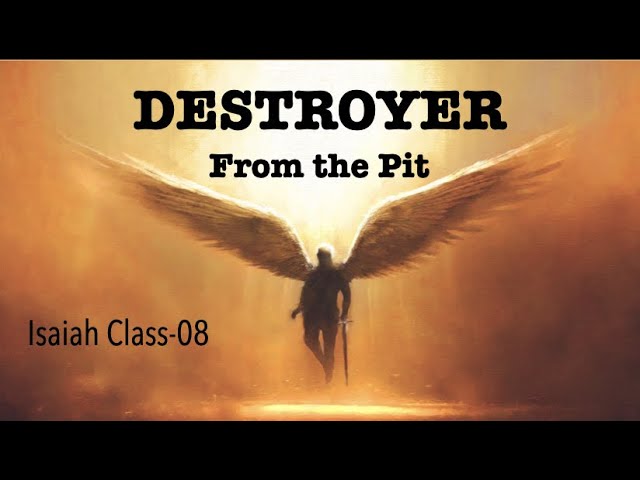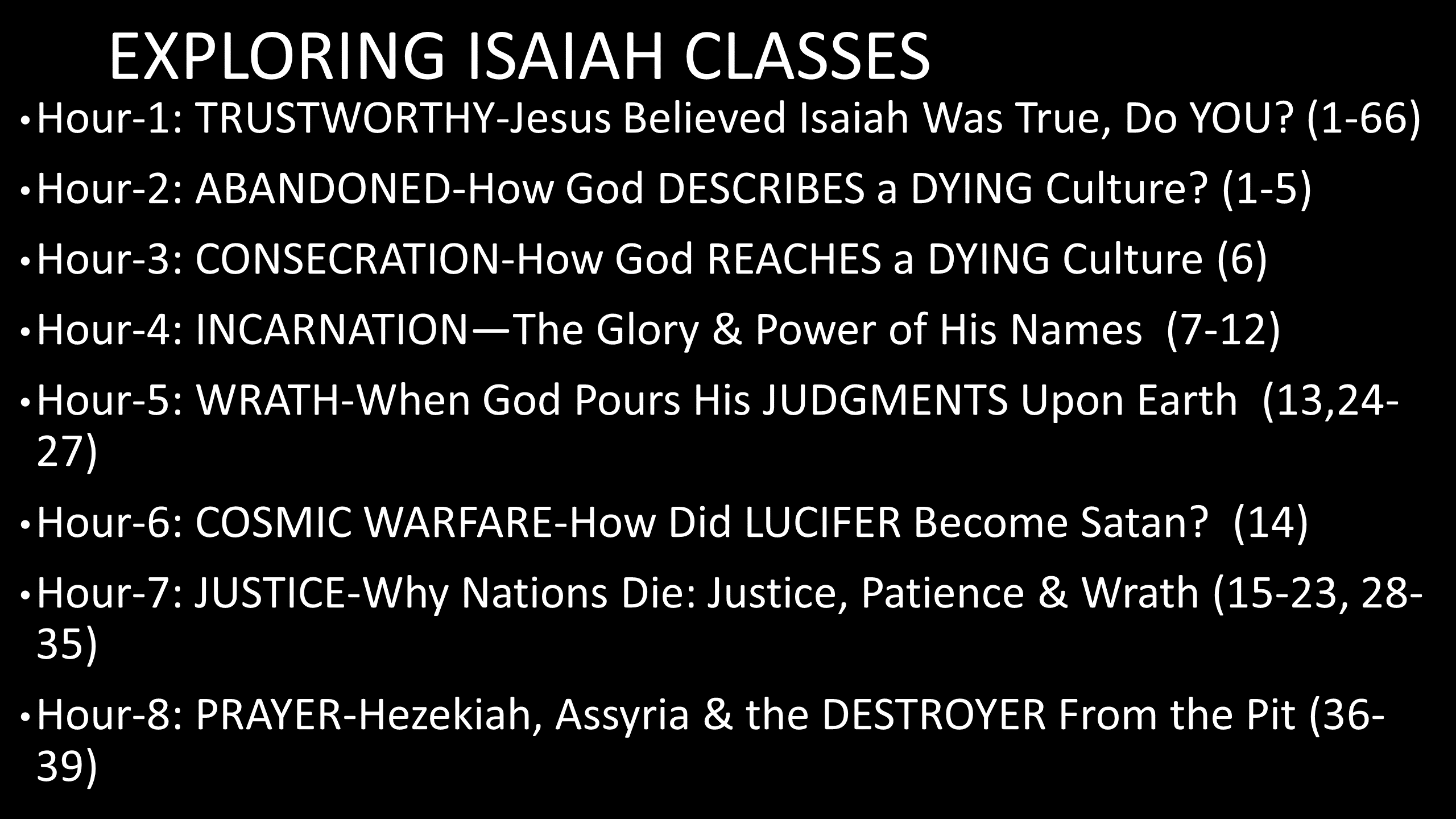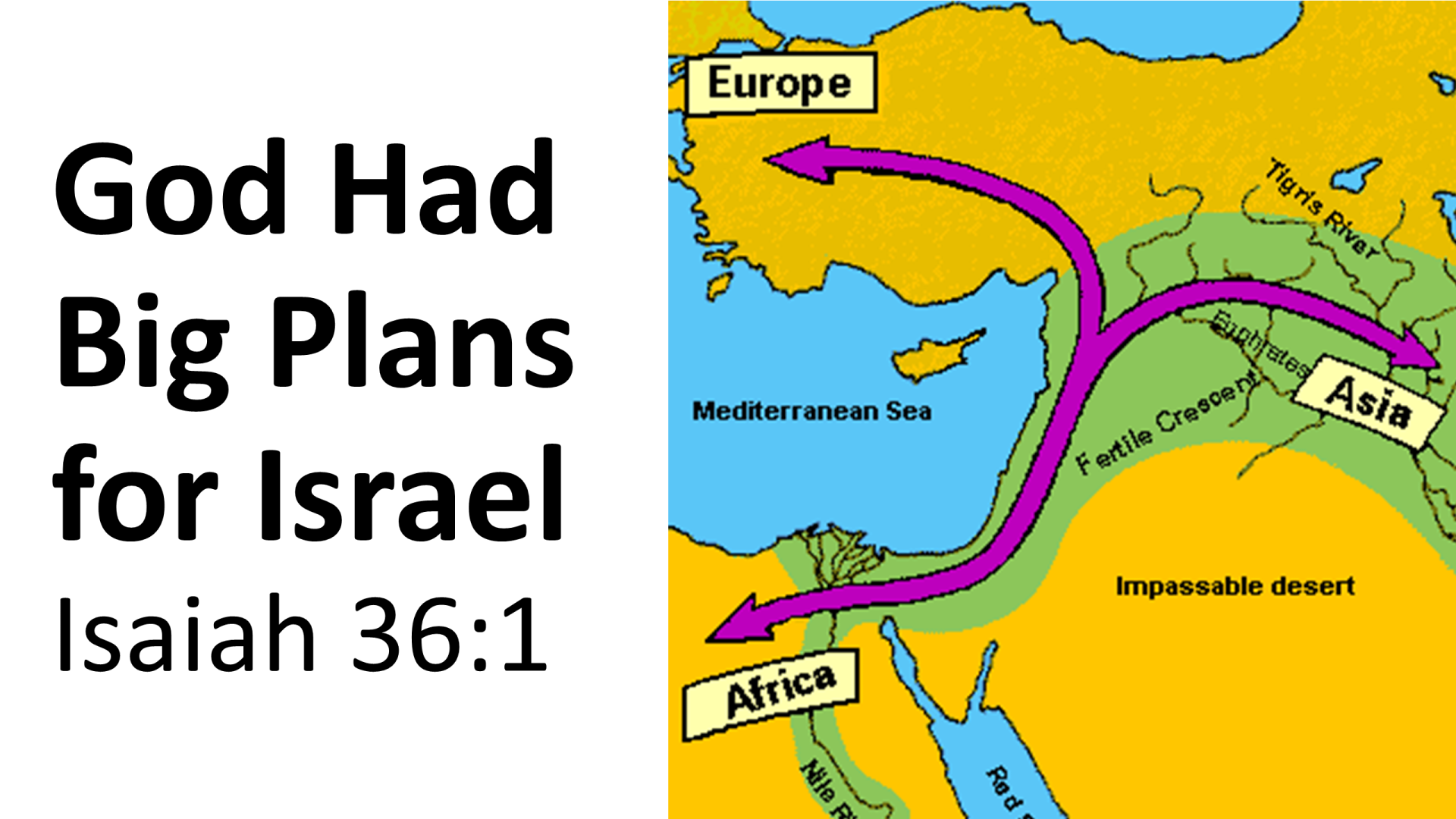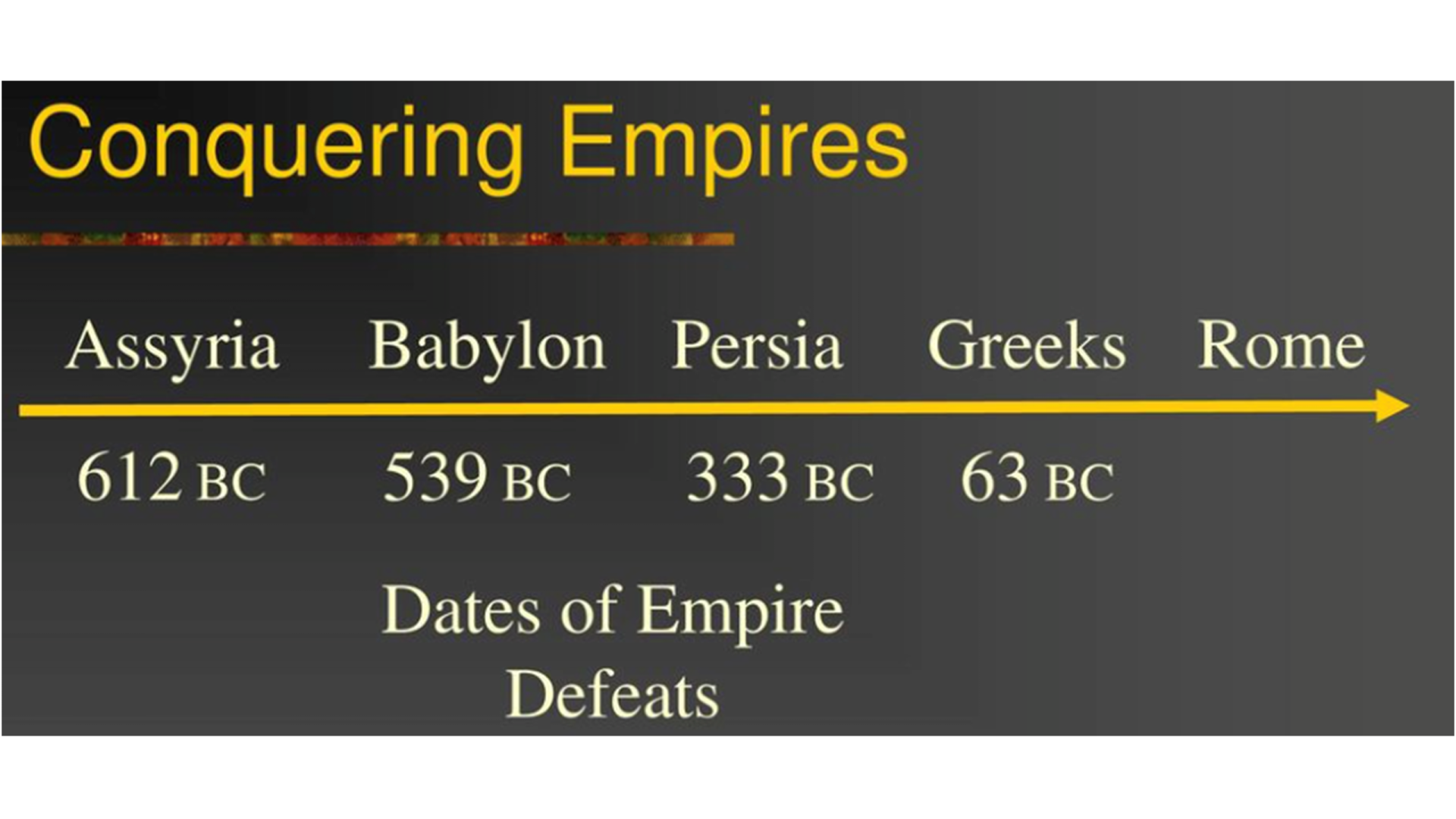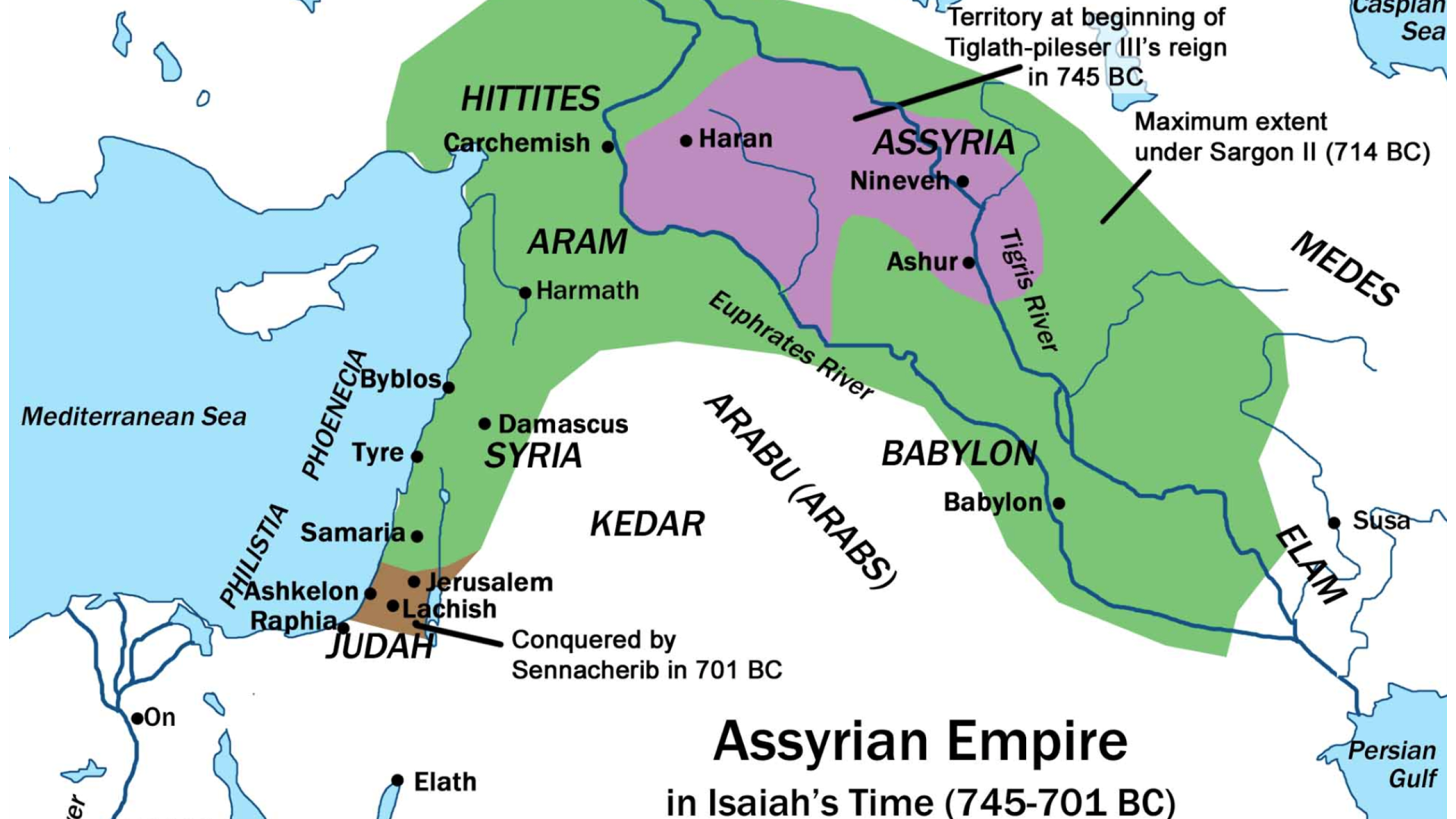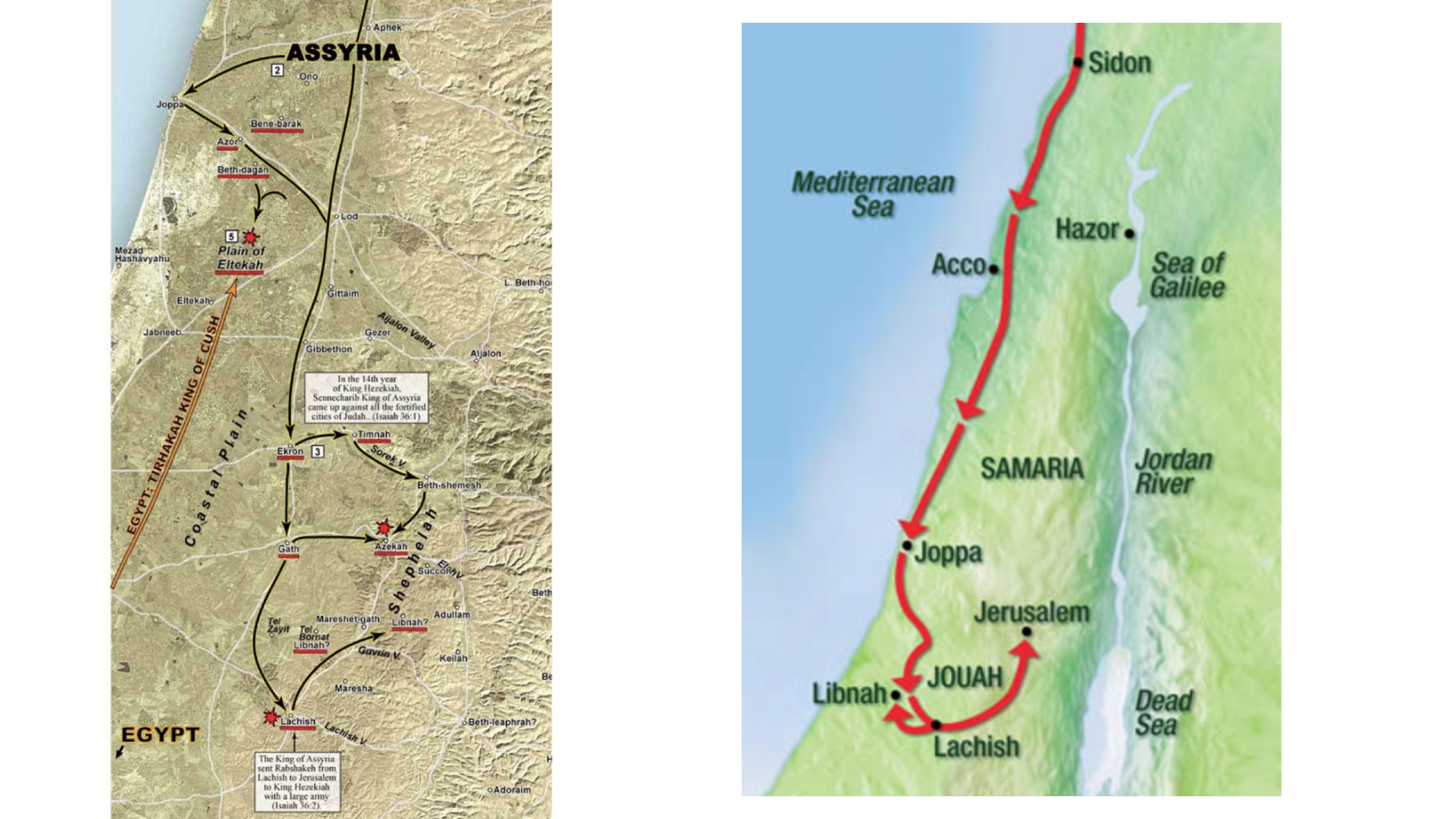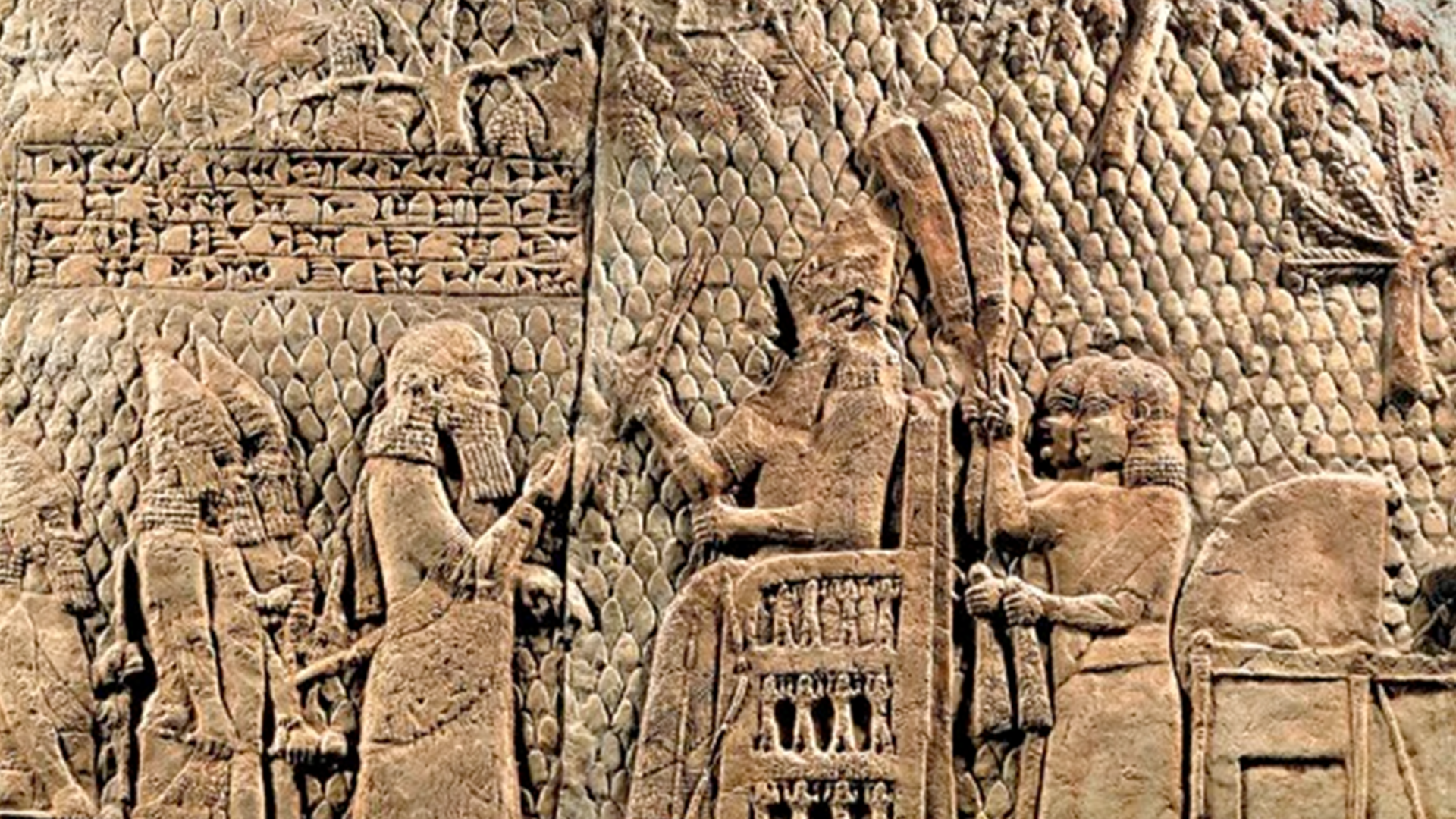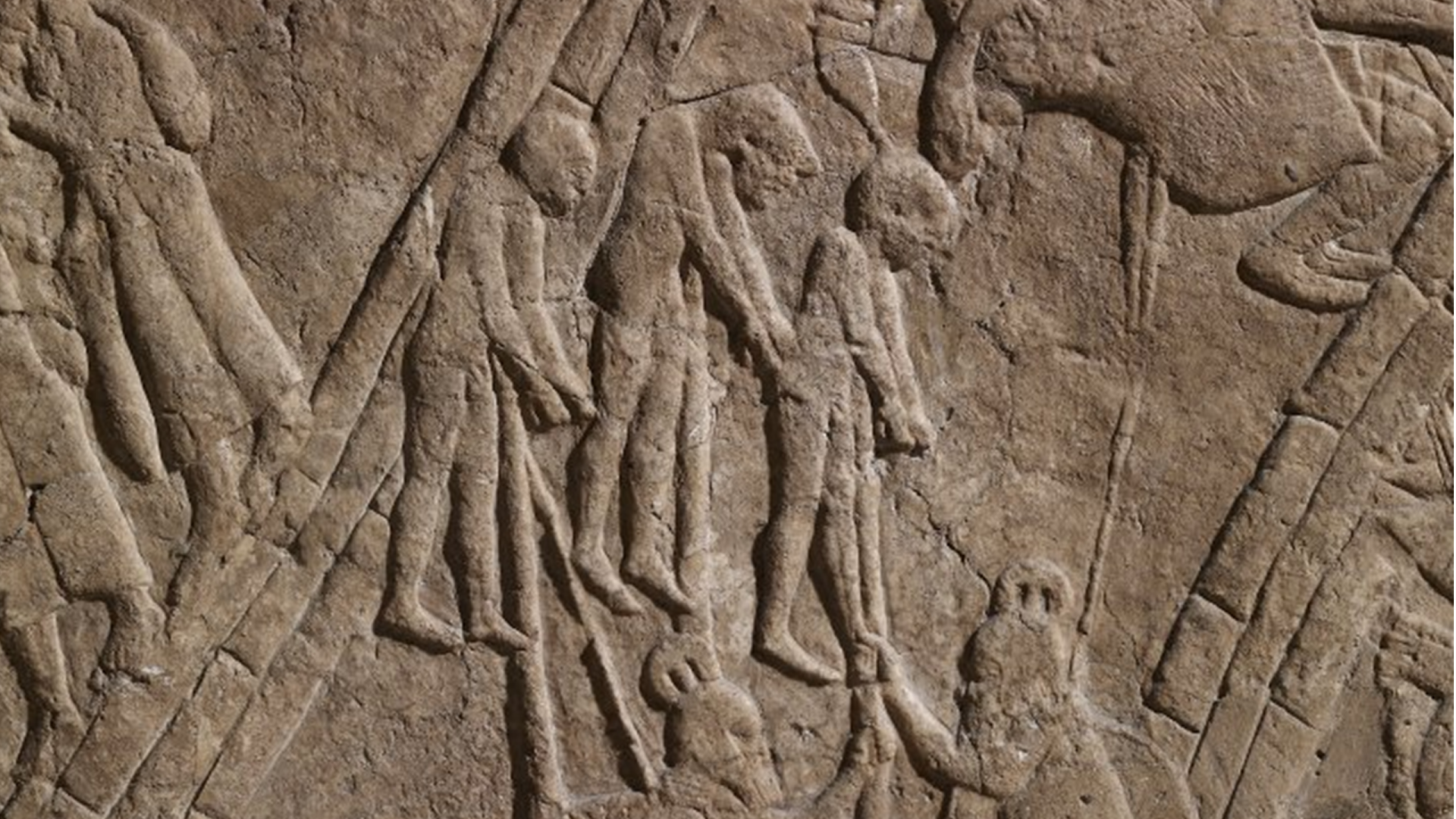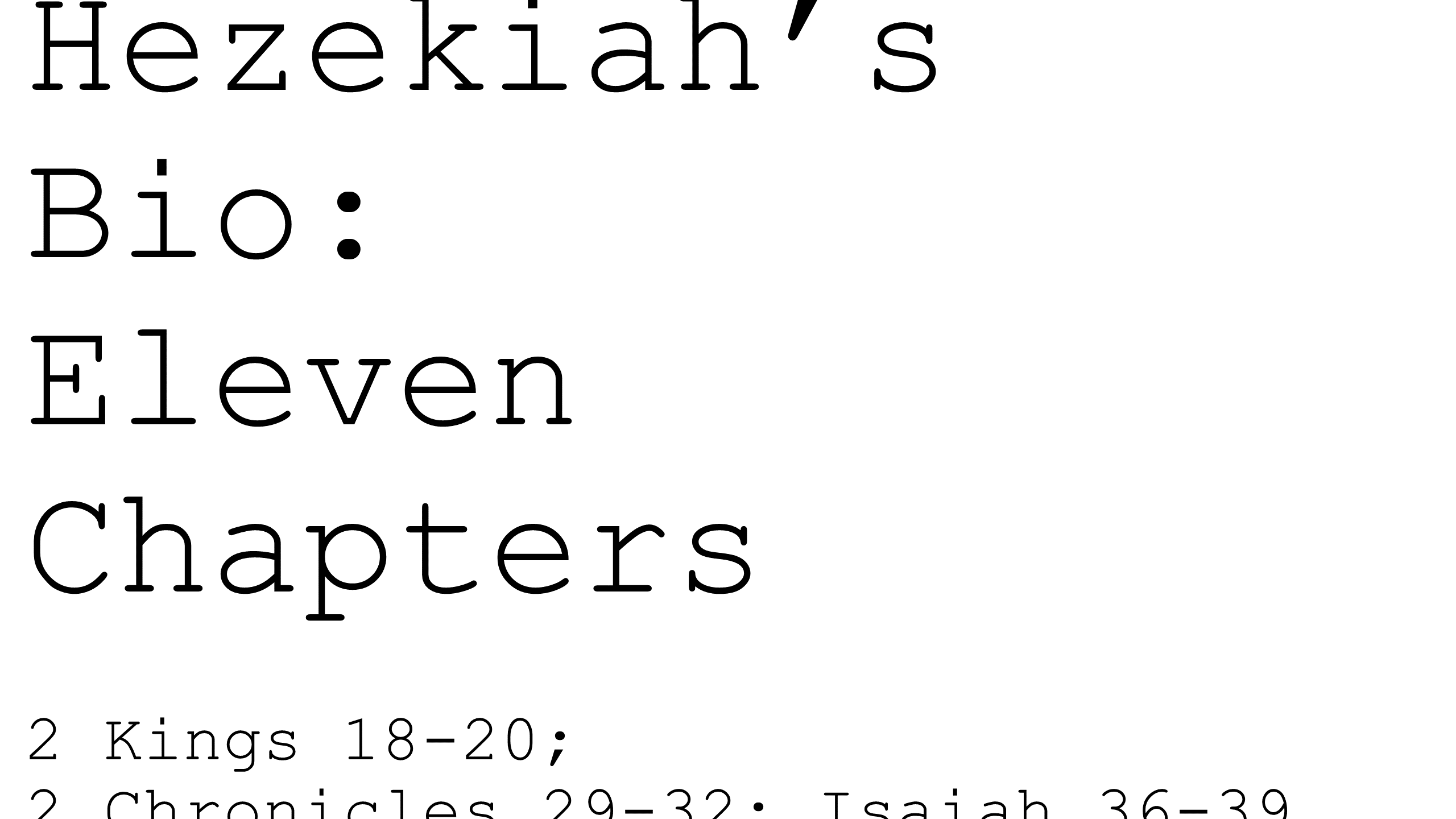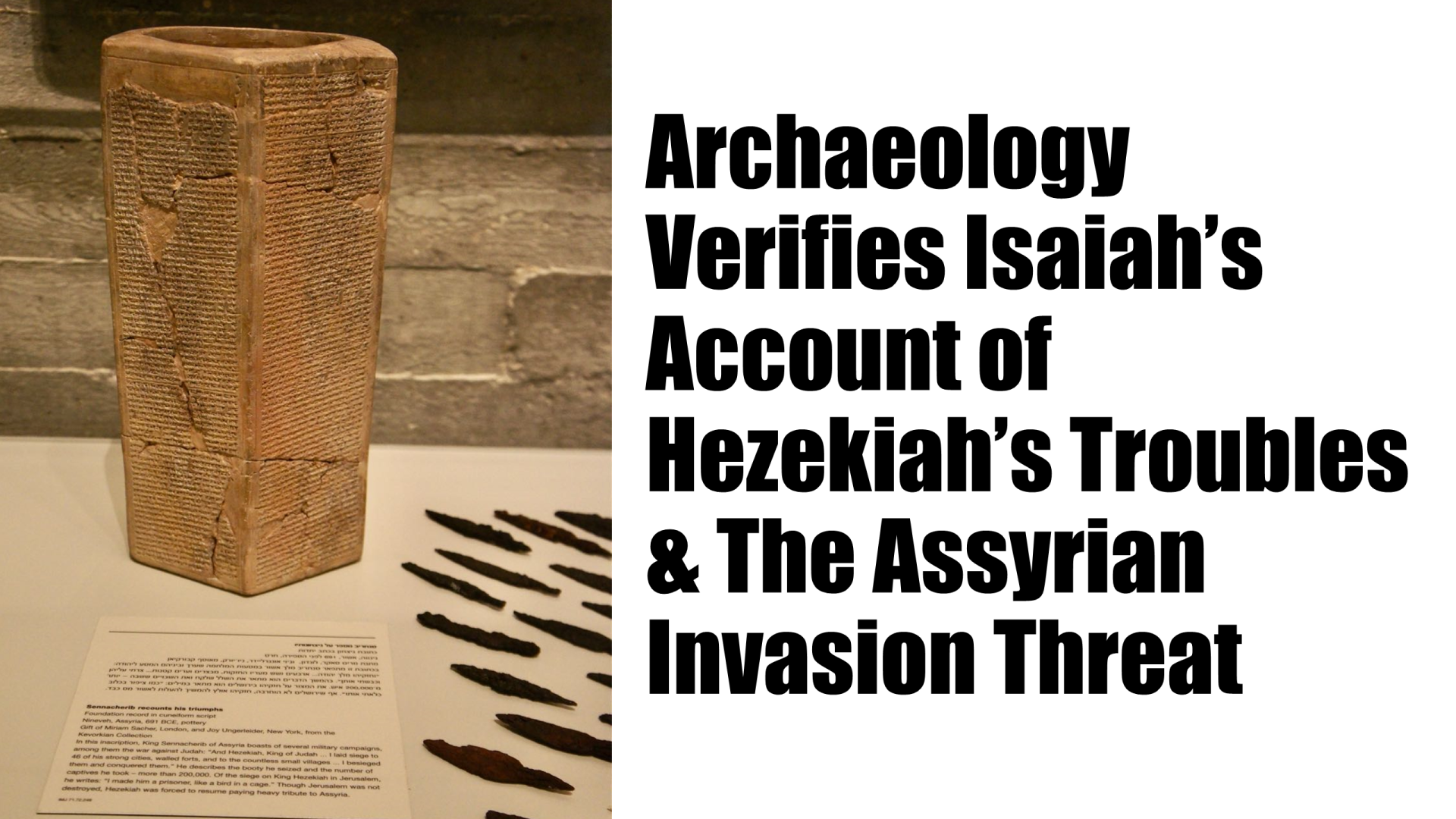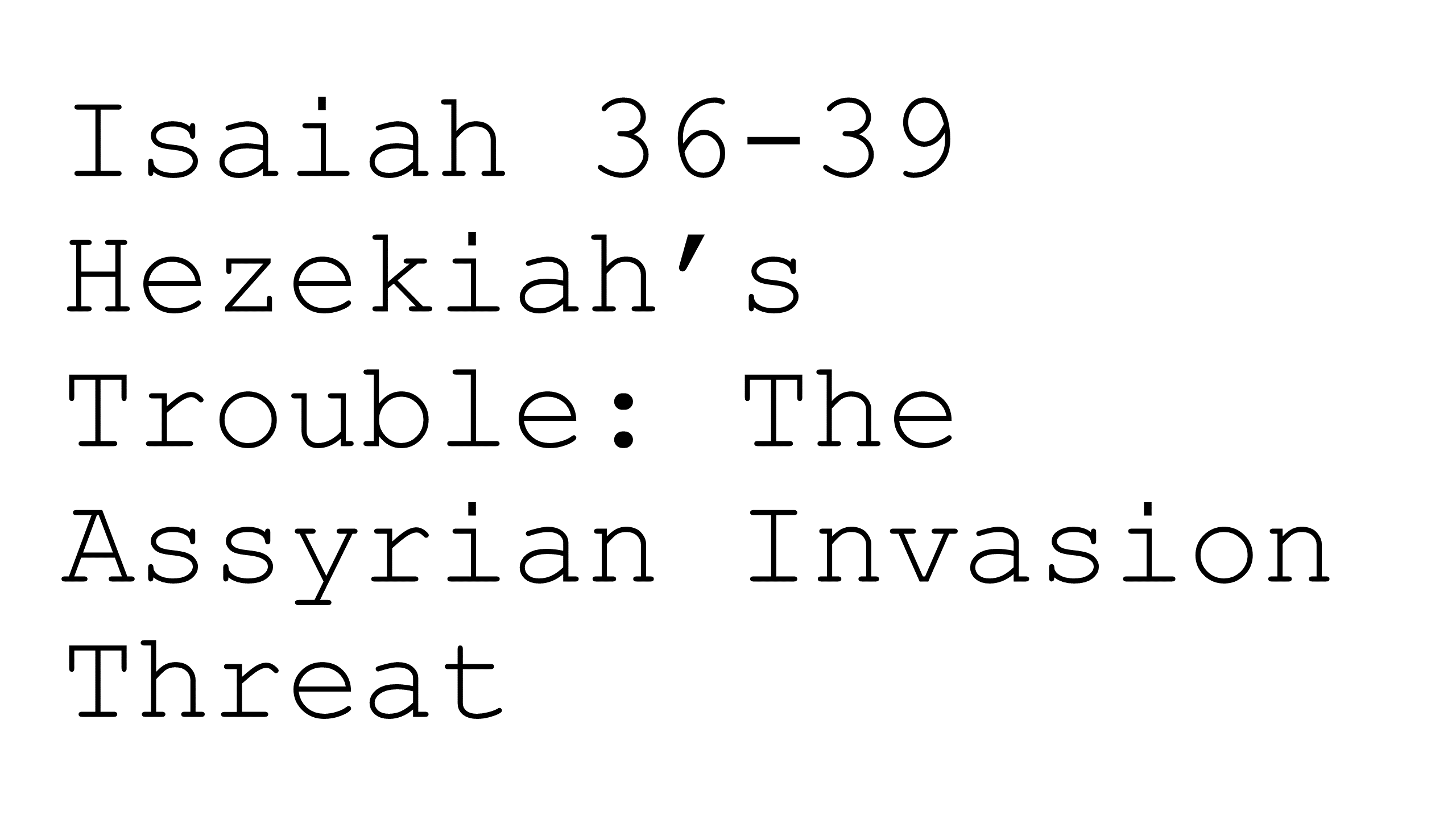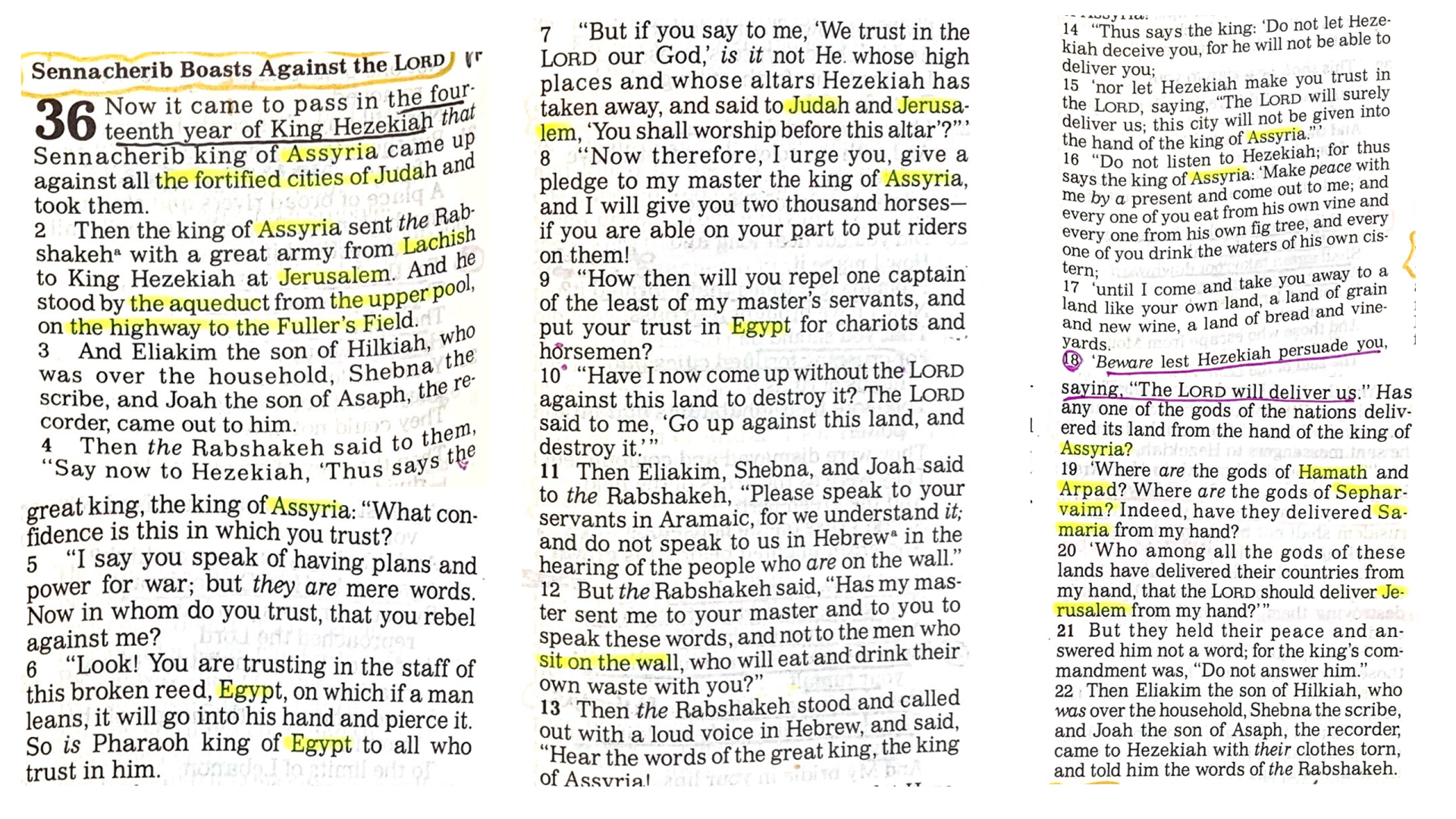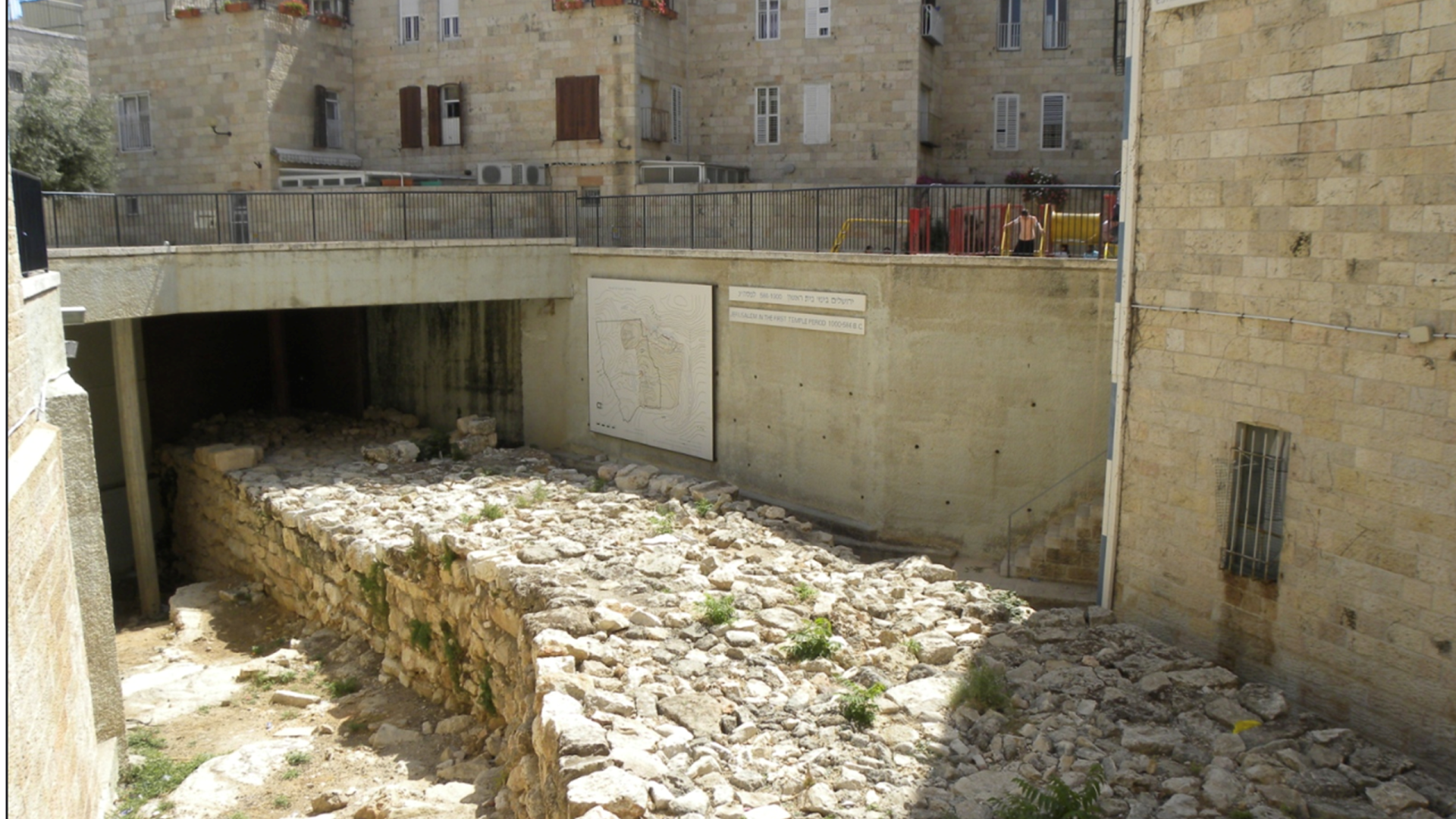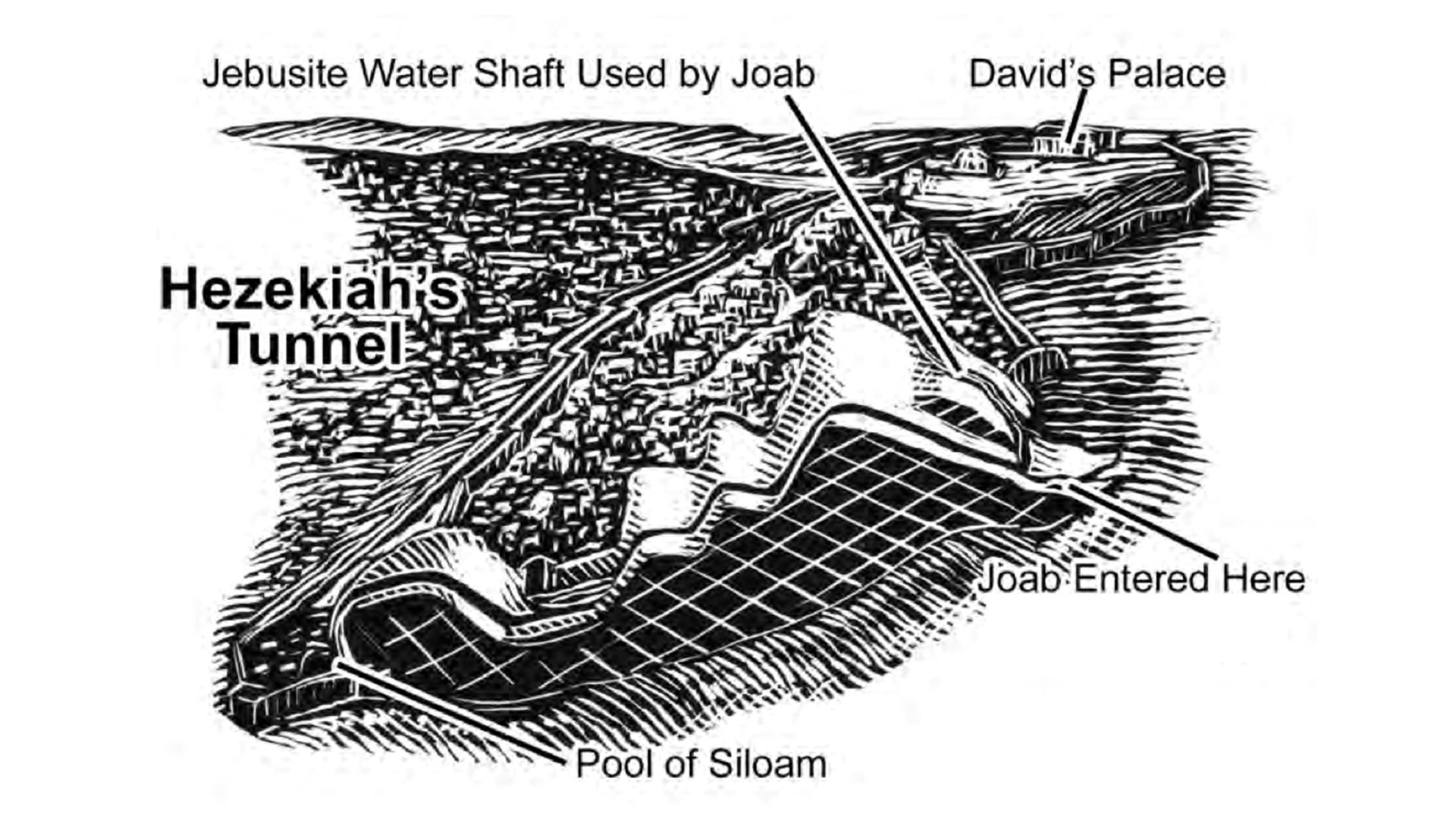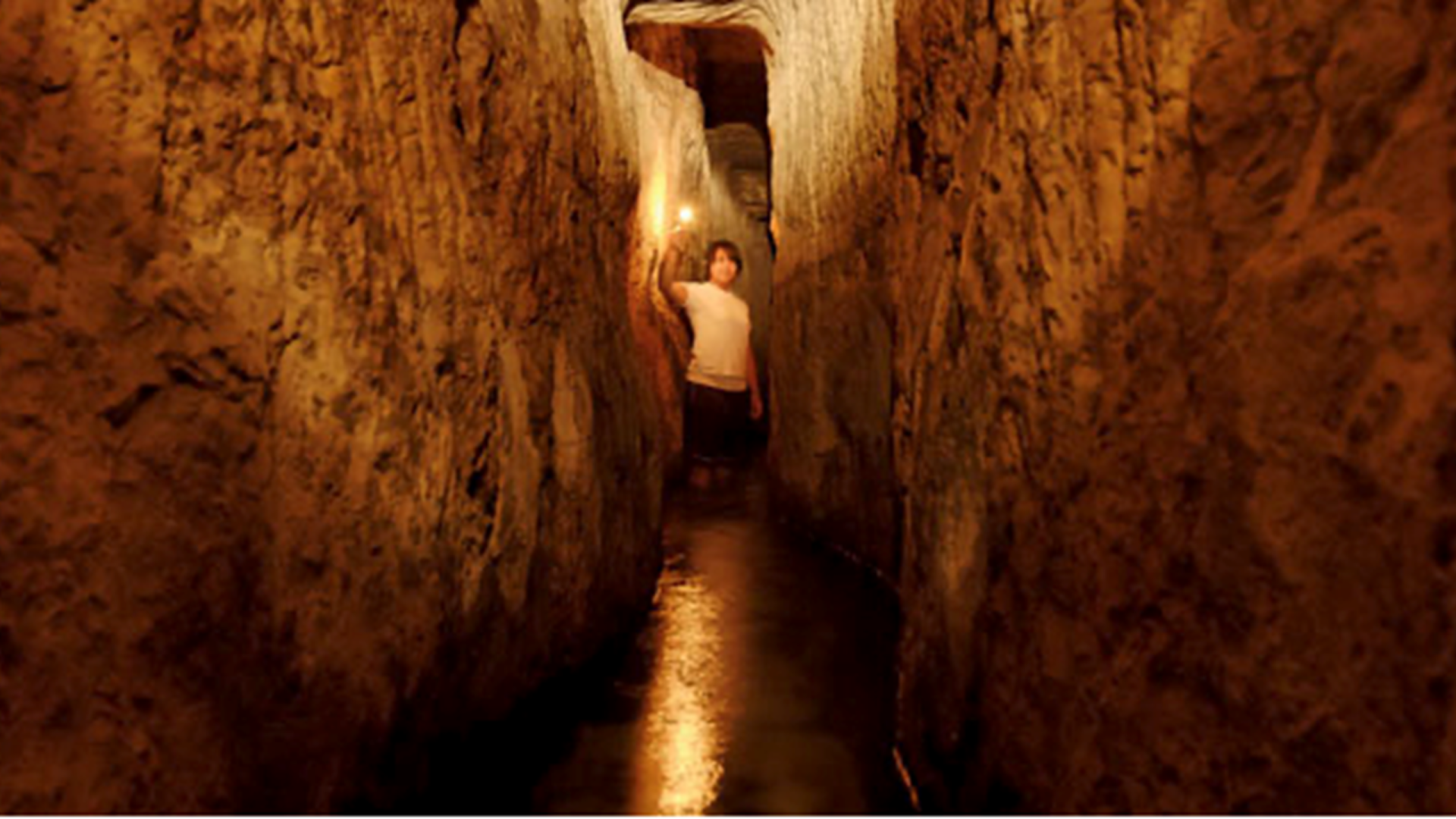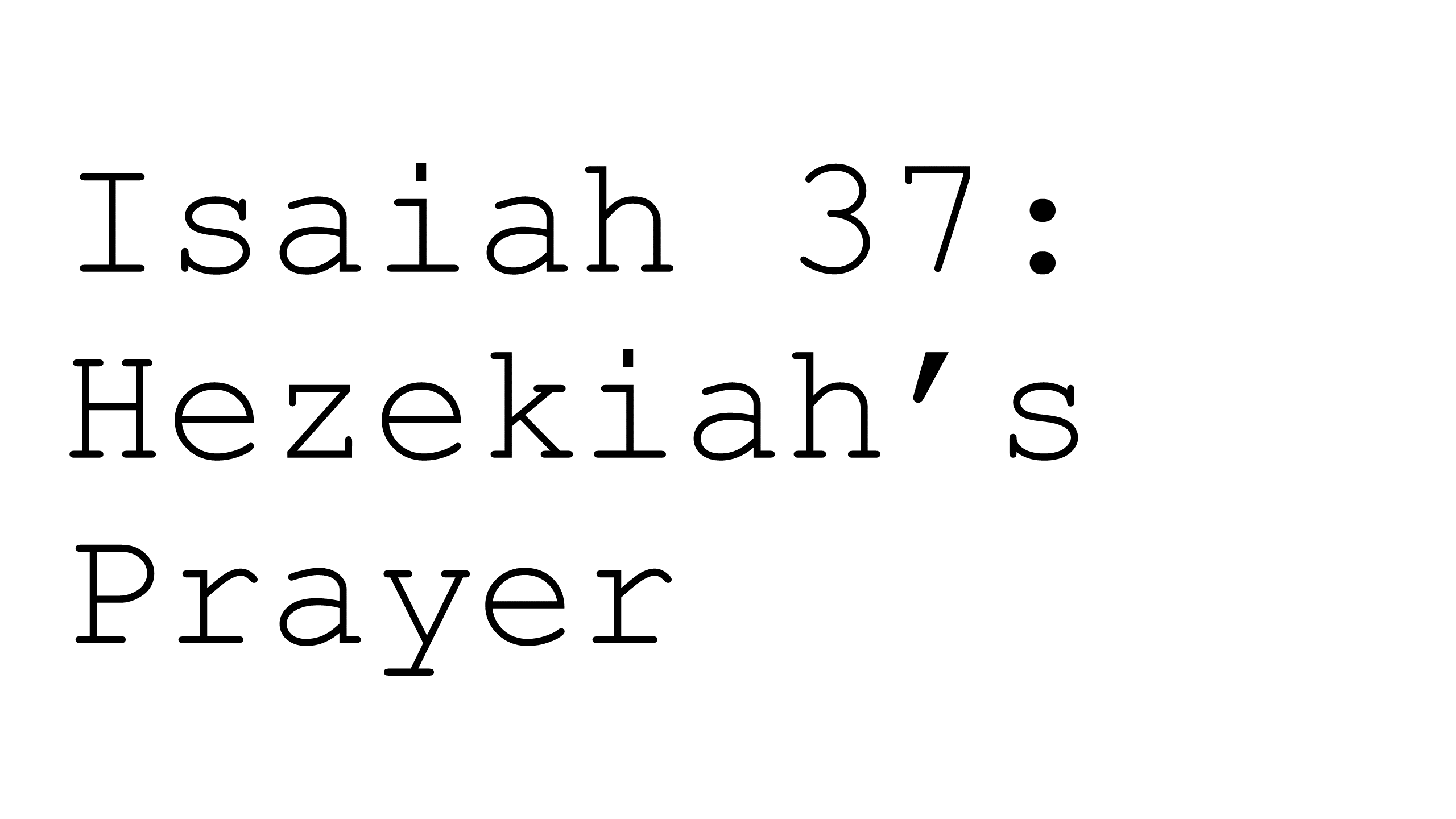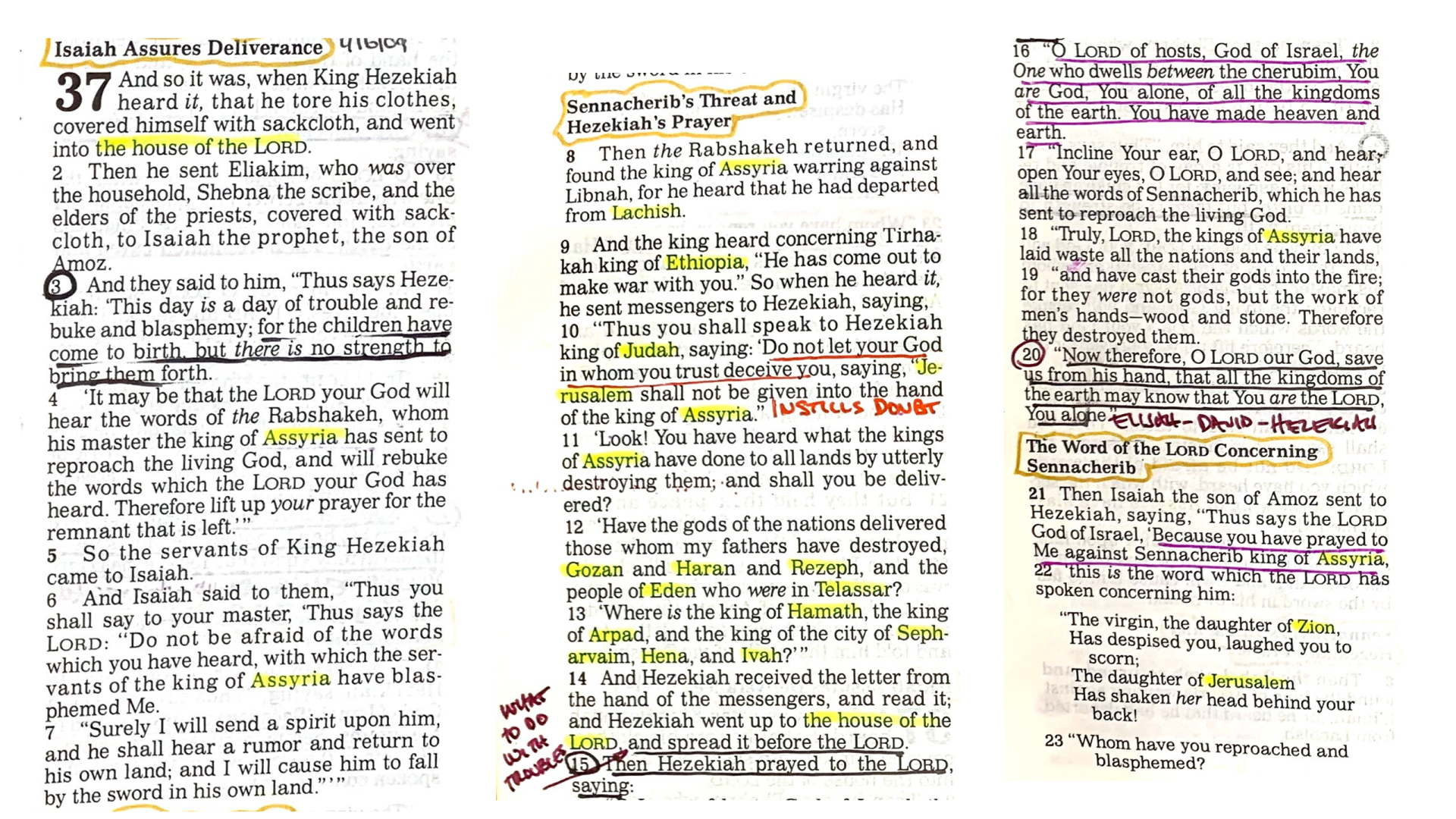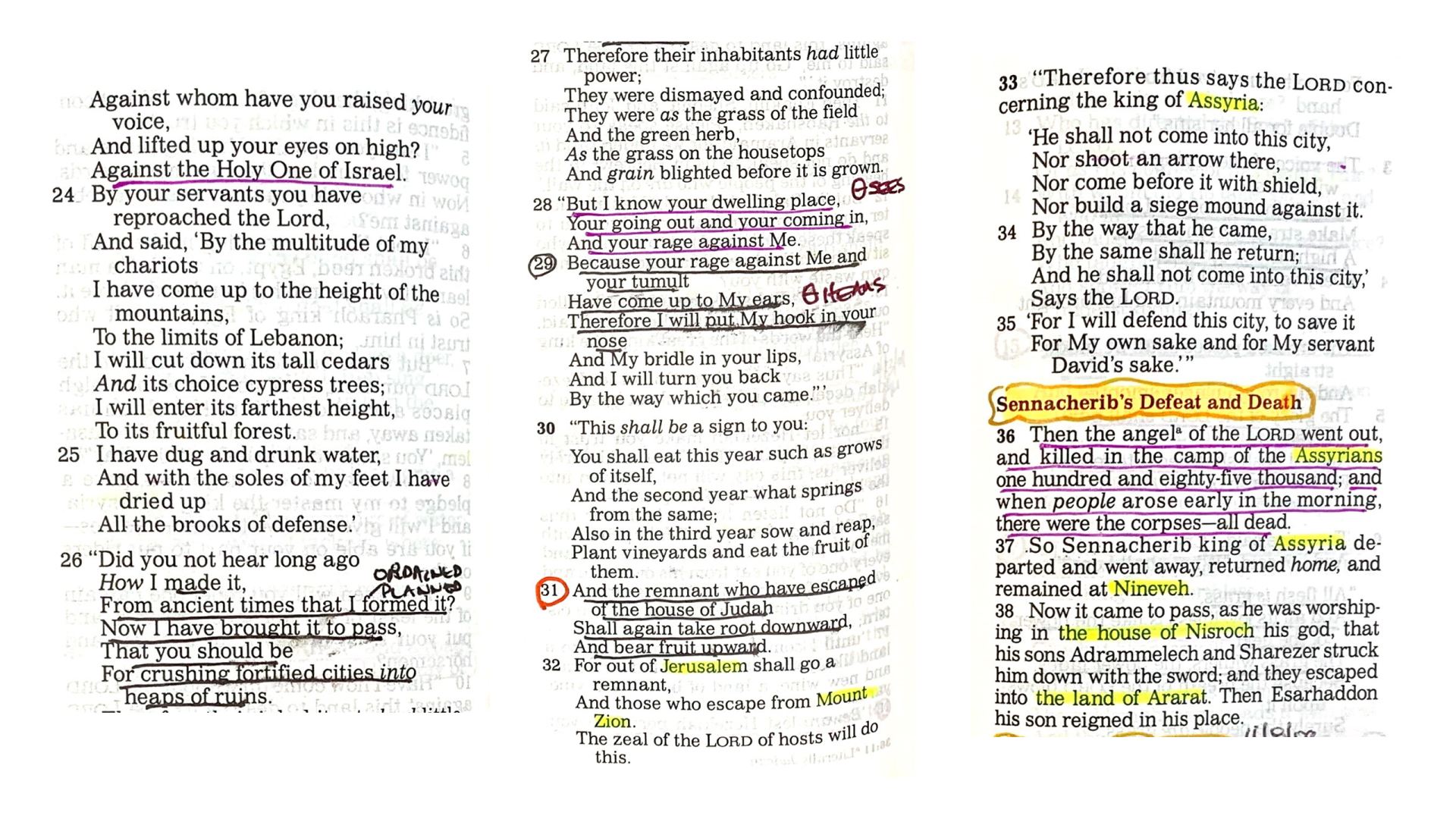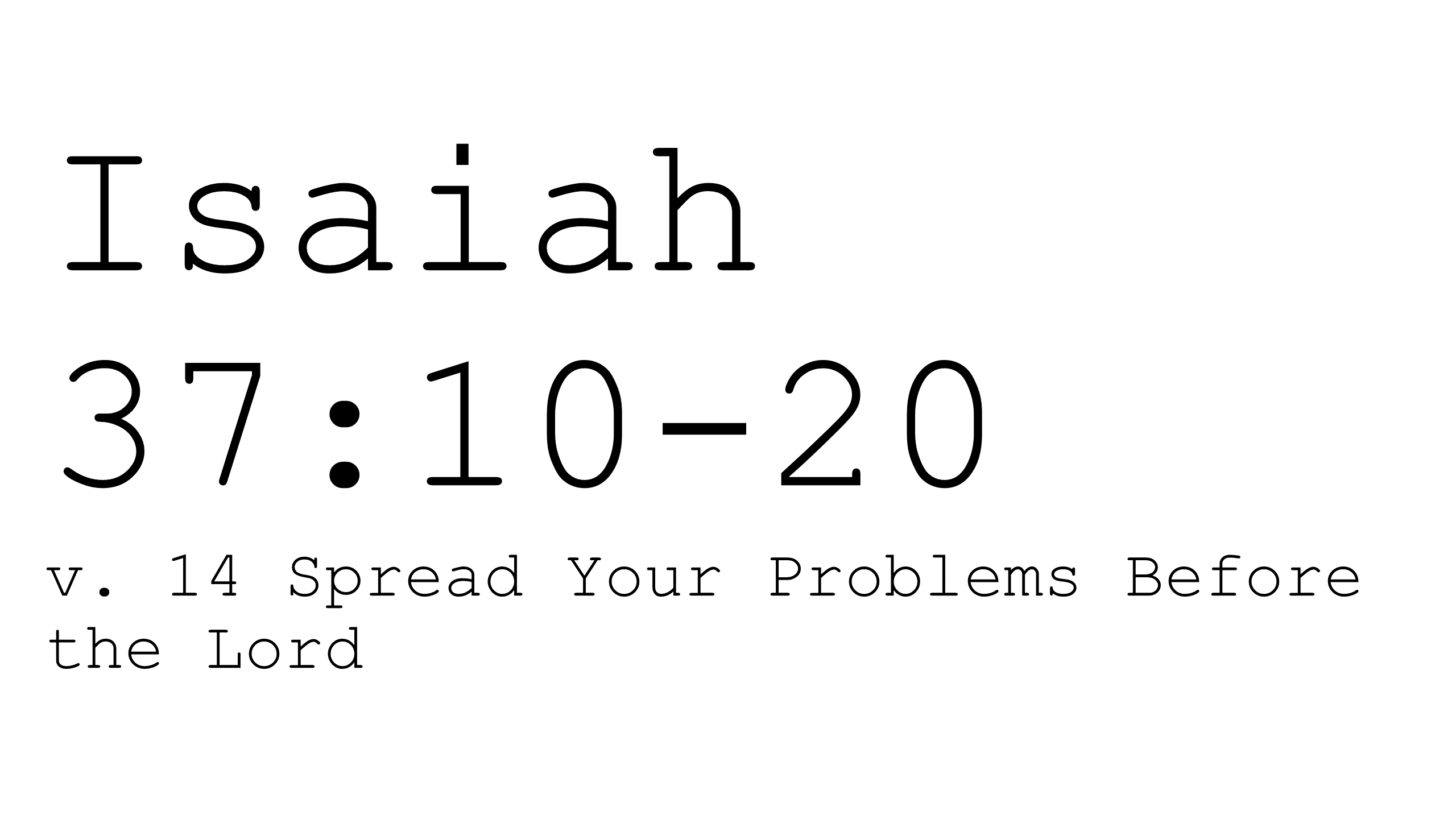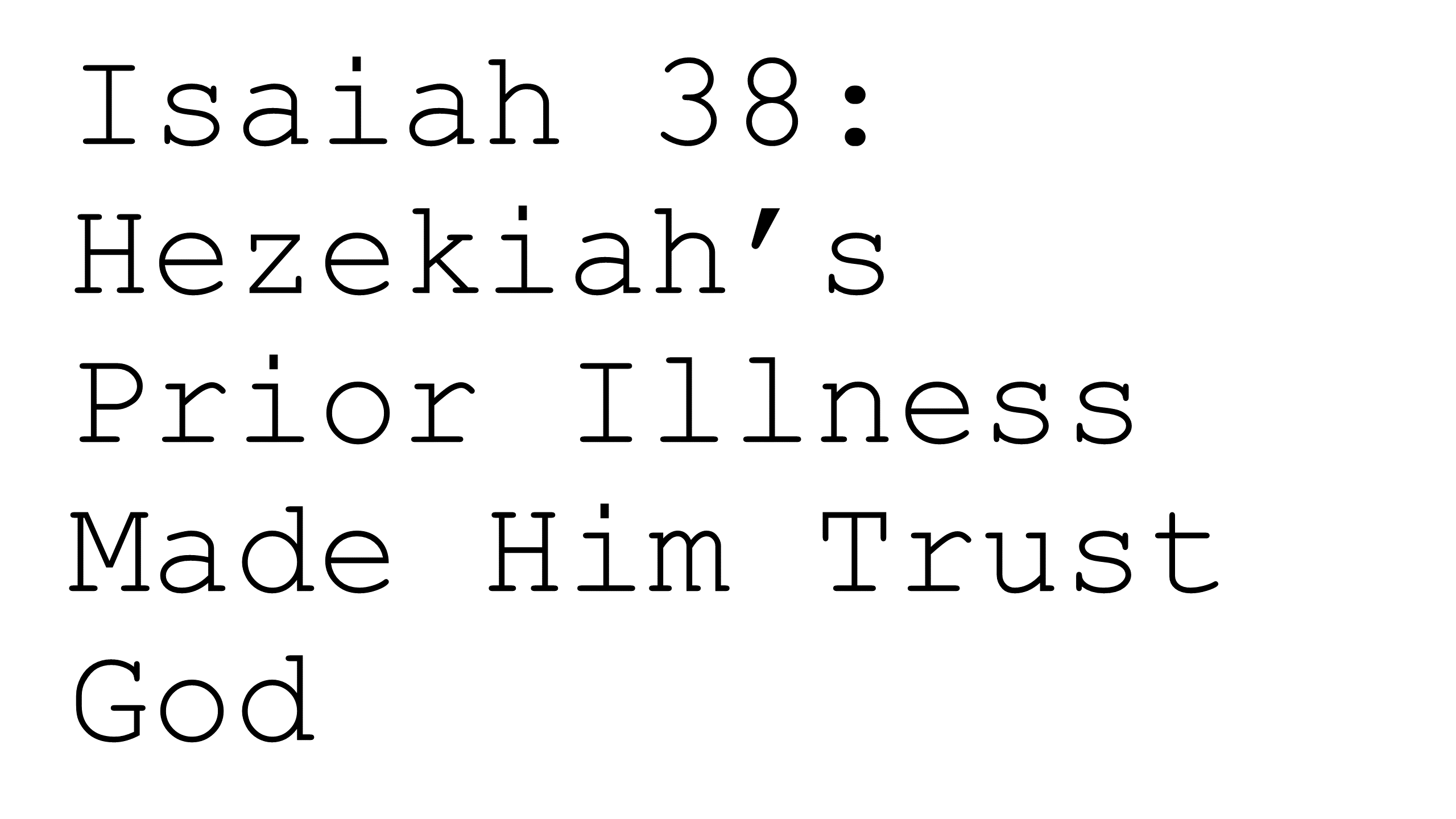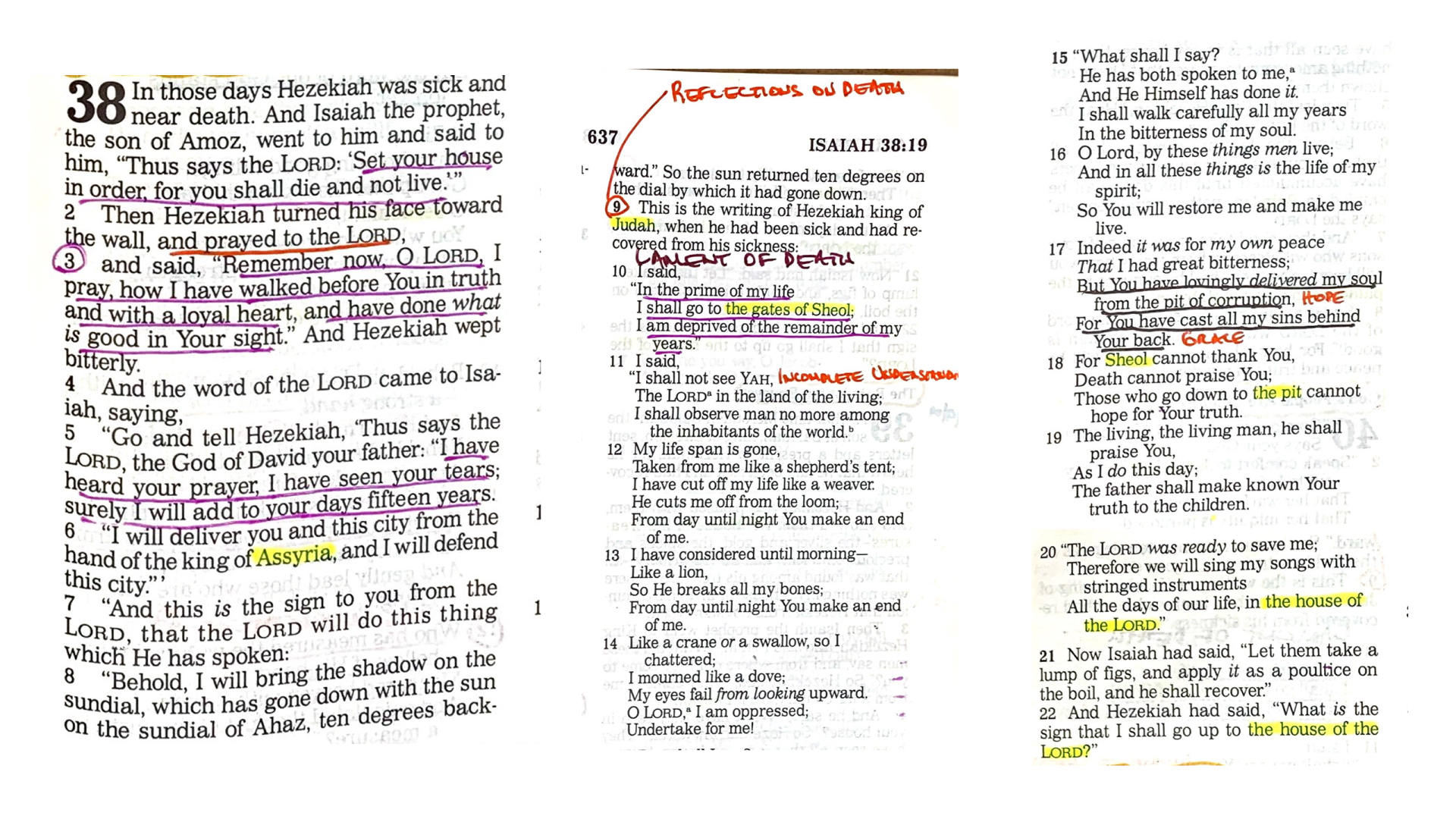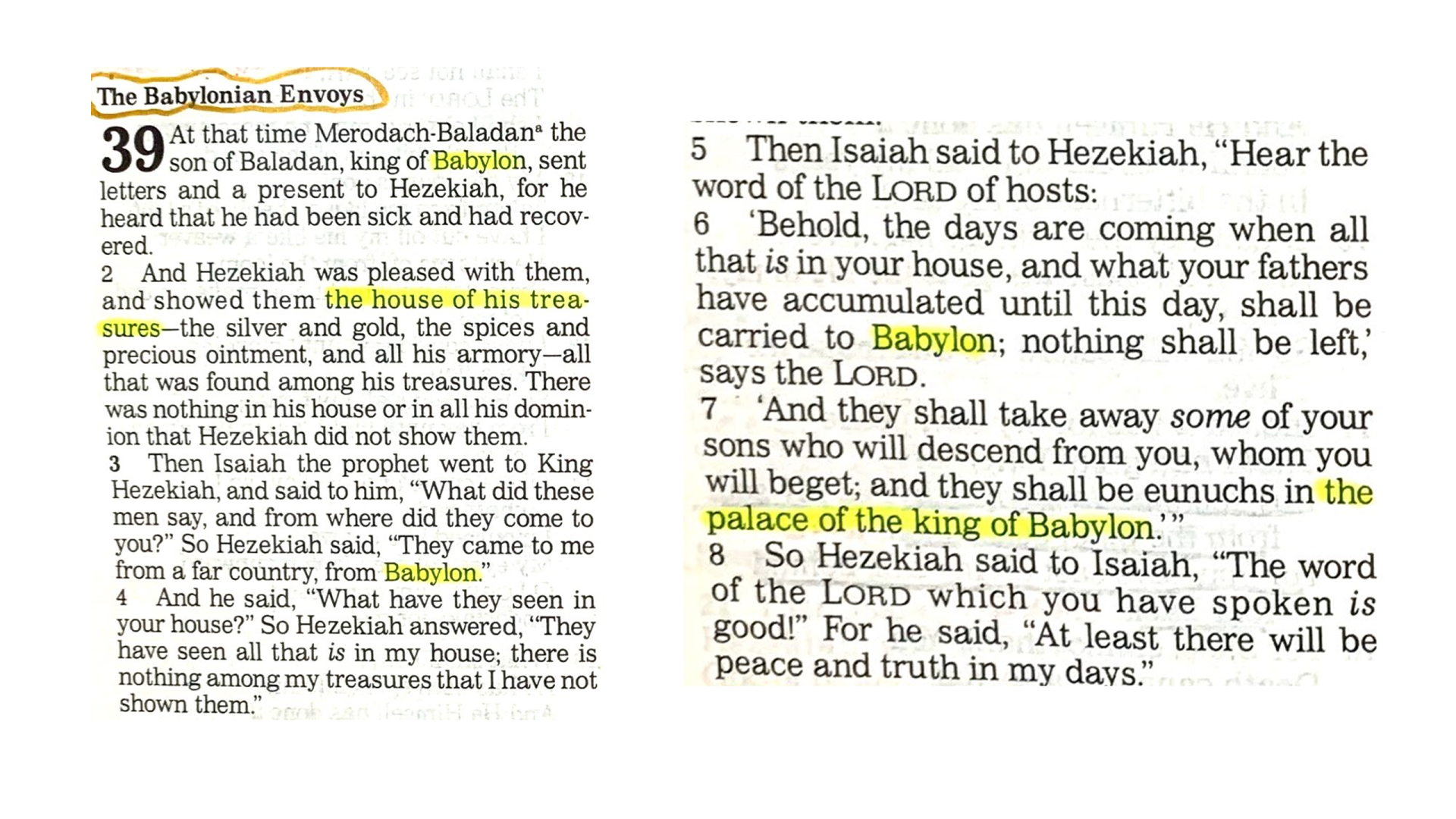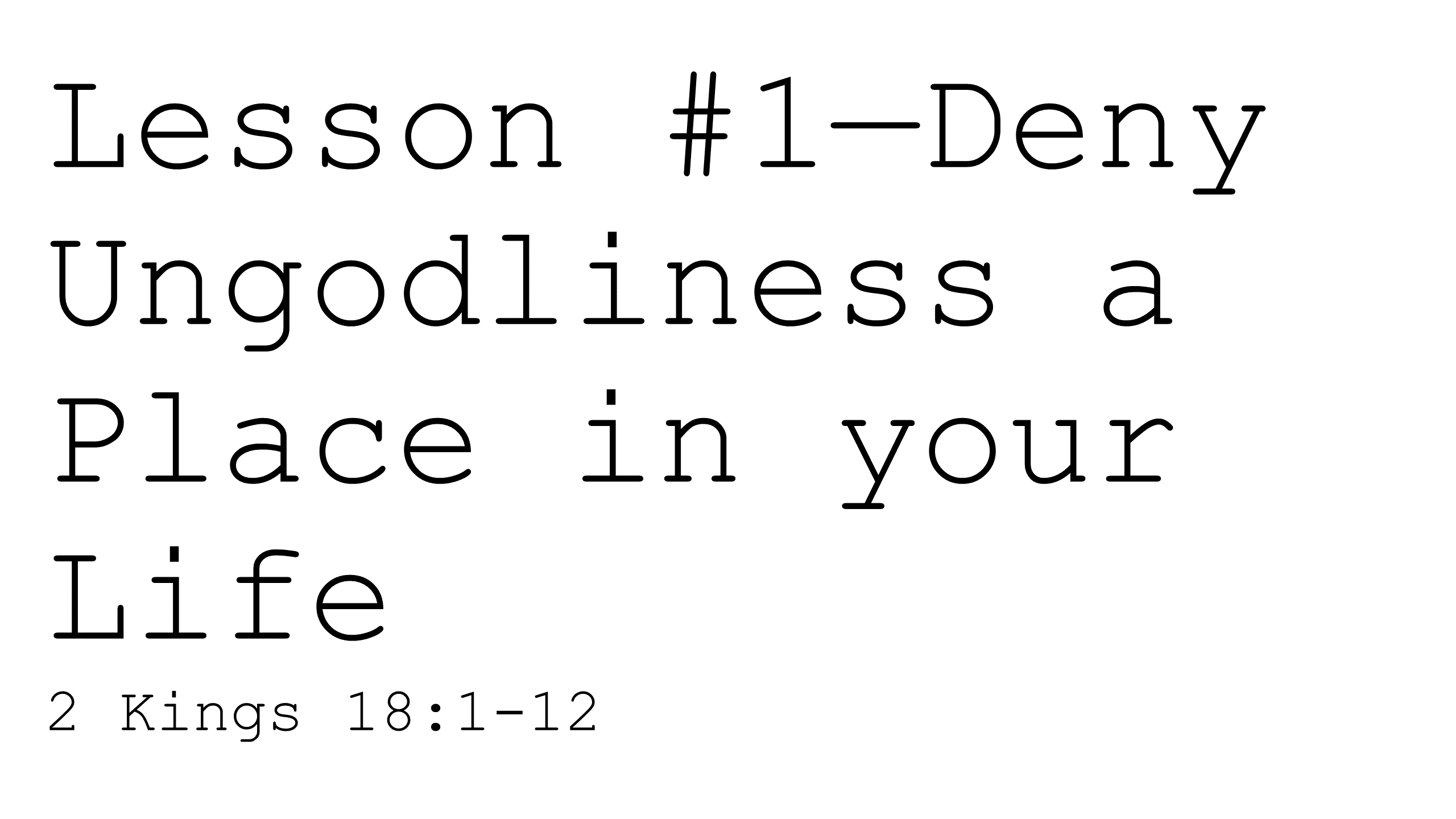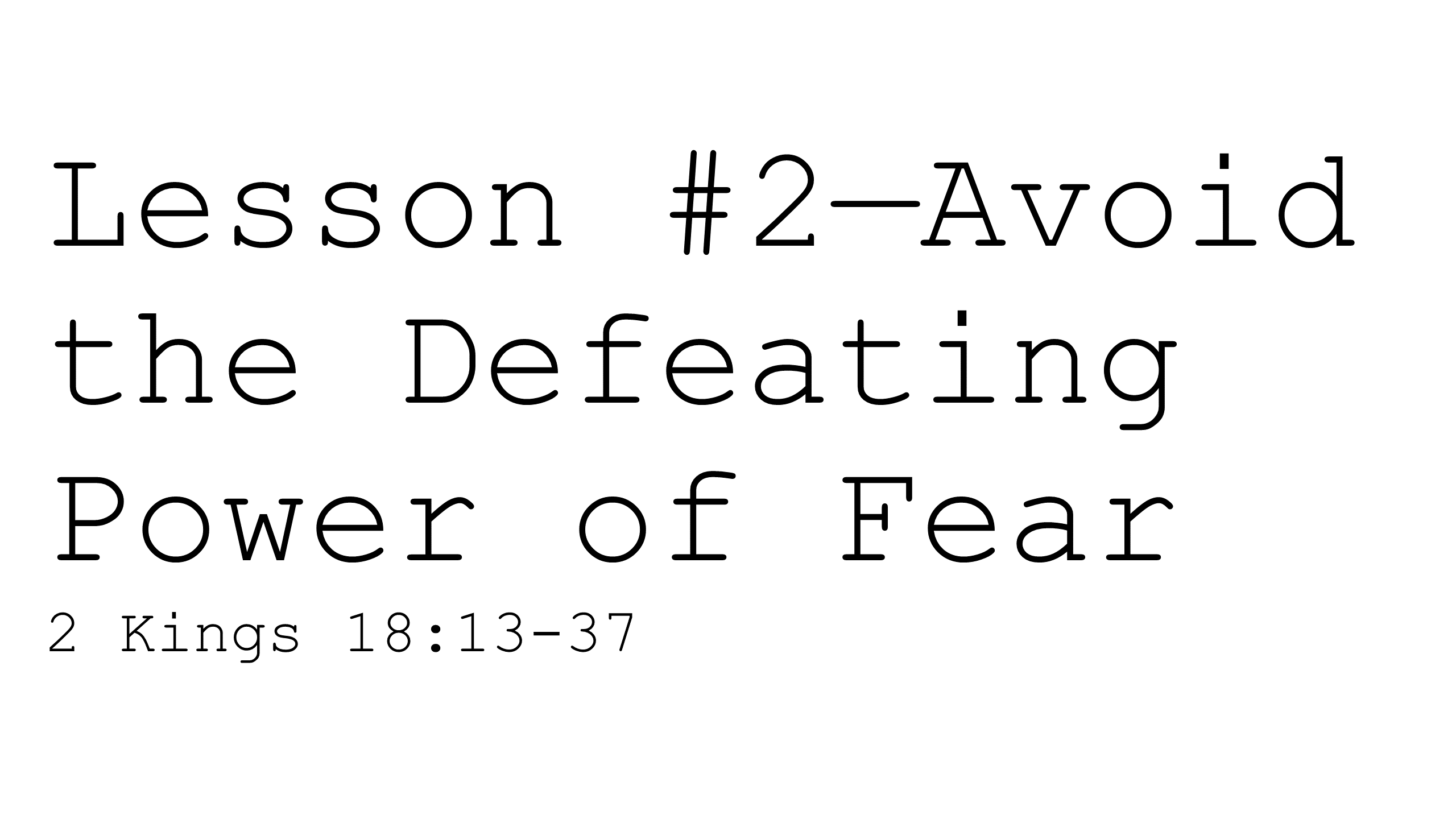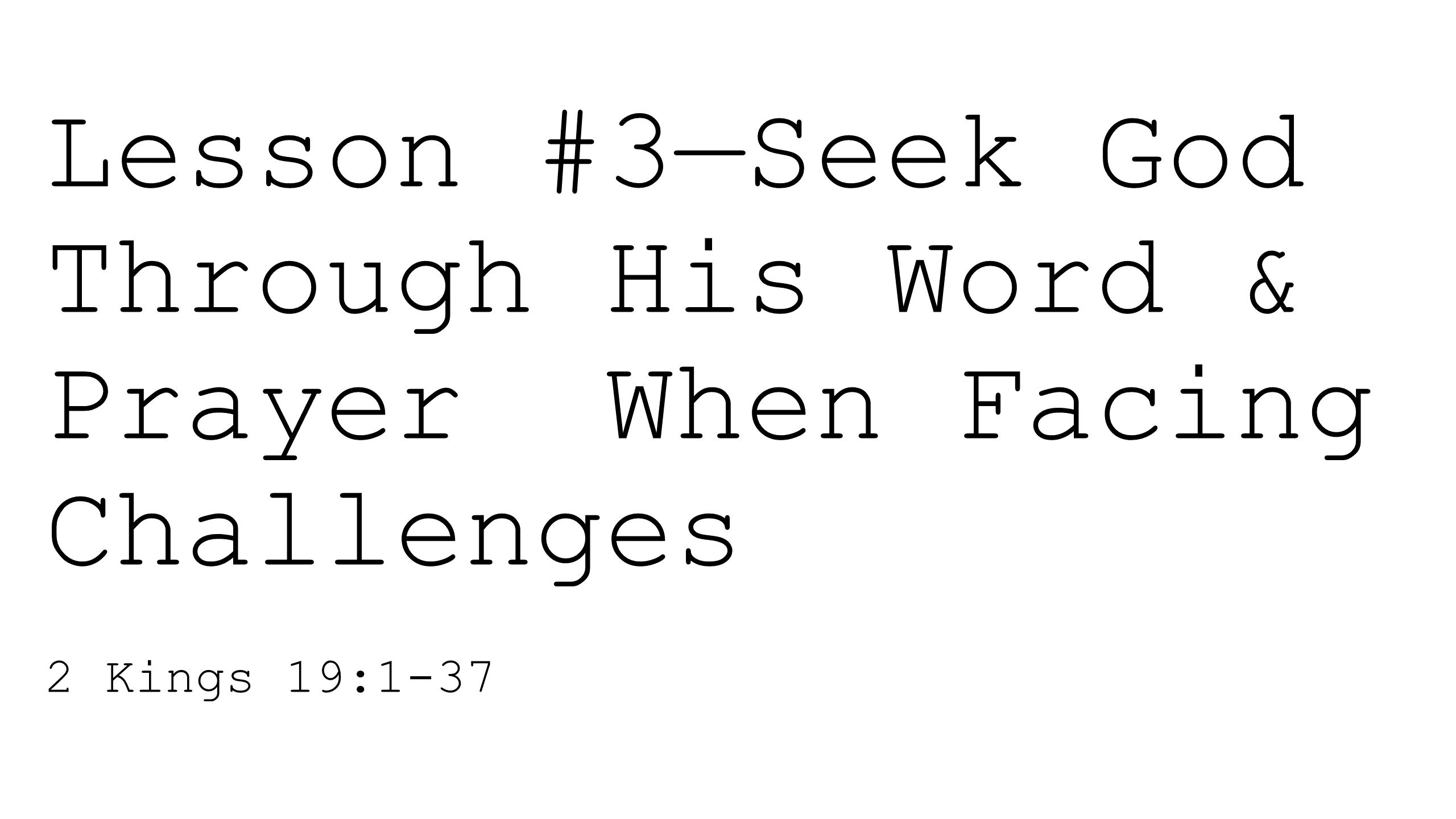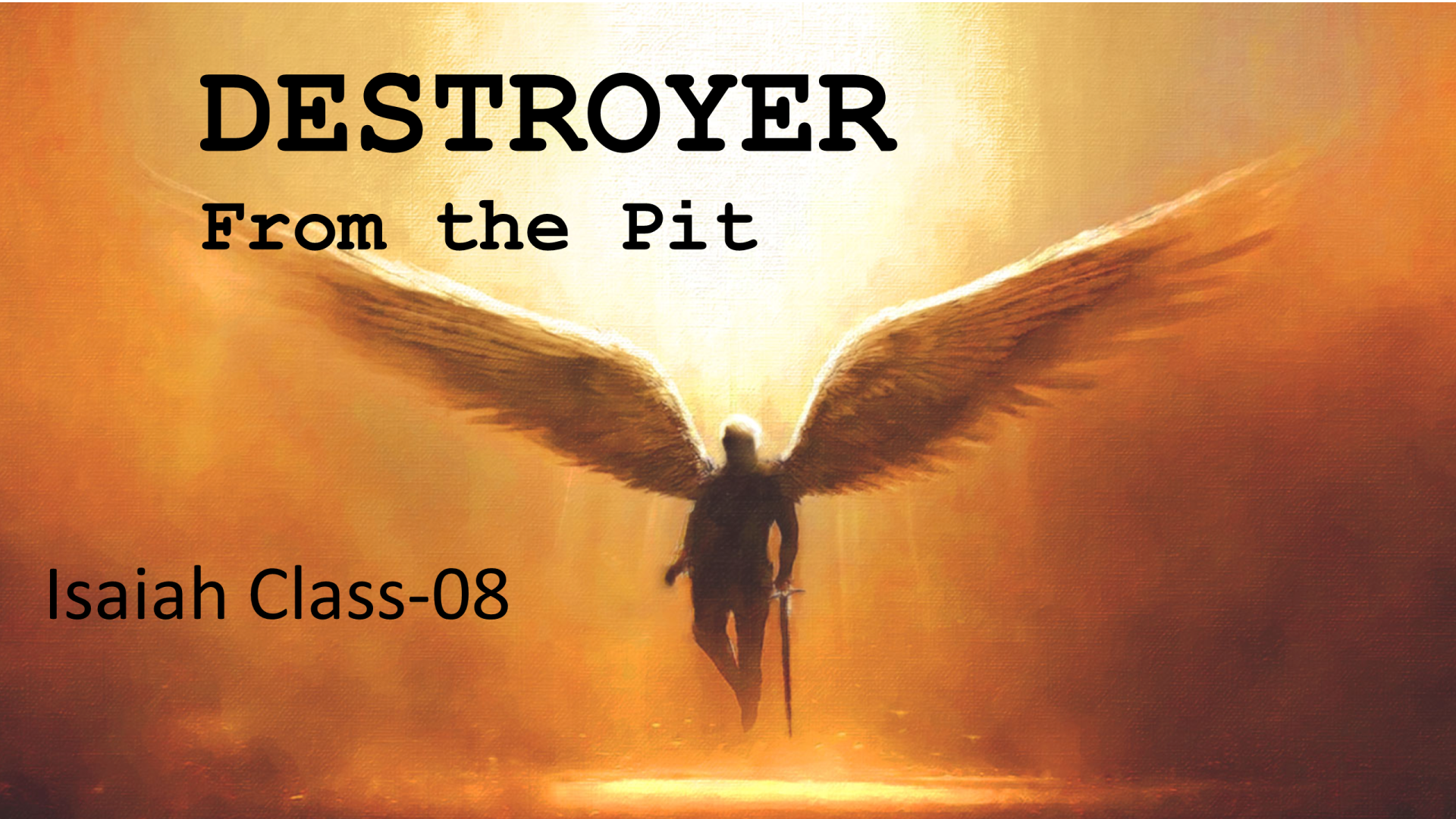EBIs-08
201029AM
Slides
Transcription
King Hezekiah had a big problem. Sitting just north of the city of Jerusalem was a huge encampment. There were 185,000 fierce, ruthless, cruel, and merciless, Assyrian soldiers. The Assyrians had sent an ultimatum in a letter. Hezekiah had taken the letter and he spread it out before the Lord in the temple, then he went home and went to sleep. According to the ancient world’s logistics for armies, it took was about 690 soldiers per hectare. Each soldier needed 156 square feet of space. So, those 185,000 Assyrian soldiers needed a minimum sized camp of one square mile. That dark night God sent the destroyer to quietly move across that one square mile camp of 185,000 sleeping soldiers and snuff out their lives. When Hezekiah woke up after a night’s sleep and walk to look over the broad wall of Jerusalem, he saw an amazing sight. One square mile of death, tents, military gear, stockade supplies; but all the soldiers were dead. That’s the power of God who watches individuals, who listens to their words, who weighs their hearts, who knows their deeds. He’s the same one we’ll each stand before at the bema seat. He misses nothing. He knows everything. He sees it all and will play it back for us in the not too distant future. That’s the lesson from the destroyer from the pit.
We’re in Isaiah class eight, as we explore the book of Isaiah. We not only are learning an awful lot of history and an awful lot of amazing things about the events in Isaiah, but we’re learning lessons. The lesson today is about prayer. Prayer is what Hezekiah deployed when facing Assyria, the greatest power of his day. God unleashed the destruction of these people.
Let’s start in our reading in Isaiah chapter 36 in verse 1. It says, “Now it came to pass in the fourteenth year of King Hezekiah that Sennacherib king of Assyria came up against all the fortified cities of Judah and took them.” Now, one of the amazing things about this verse is, it’s so historically verifiable. A British government official in the 1800s was assigned to part of the British empire and he knew that the Assyrians had been in that part of the world. He excavated and found the actual record, a record hall with all kinds of cuneiform documents telling about all the cities that were destroyed in this campaign, amazing.
If you look at your slides, the destroyer from the pit. Class eight is just one of 15 classes that we’re progressively going through in this book. We’ve already studied eight and we have seven more to come.
In the next slide, we learned something amazing from the 36 chapter of Isaiah. God had big plans for Israel. If you look at this map, I want to show you something. Israel was right here, and Europe, Asia and Africa are here. God’s big plan is that everything would flow through His people.
Now, look up from the slide and think about that. The strategic location of the land of Israel would put unique pressure on them. That’s what God wanted. God wanted His people to feel the pressure of the world around them. You might call it, God’s testing ground. In this land there was so much pressure in so many tests, but through these all the odds were against Israel so that they would have to reach out to the Lord, so that they would need the Lord in every way. From the geographic location for the crops where they had to trust God to send enough precipitation for everything to grow, all the way through to being able to protect themselves as the biggest international highway of the day ran right through their country. Every army came along that route. All communications, trade, and even armies of the ancient world had to pass through the land of Israel. The message of God’s relationship to man through chosen people would then be spread to the whole world because communication, because trade, and because even warfare, came through. The gospel of the true and living God would go everywhere and spread. The people of Israel were to be living testimonies of God through their lifestyle. In times of war, when God showed His power, when God delivered them, that would travel on this highway to the furthest parts of the world. In everything the Lord said, I want you to let the world know about Me.
This message went around the world when the great King Sennacherib of Assyria invaded Judah in 720 BC. When he reached Jerusalem, he blockaded the city, he mocked Hezekiah, but most of all he raised his fist and mocked and, God says, raged against the true and living God of Heaven. When the angel of the Lord killed the soldiers and the officers of Sennacherib as the Bible says, and Sennacherib returned back to Assyria in disgrace, not only is this event recorded in the Bible but King Sennacherib himself chiseled into the walls of his palace an account of this battle; for all the world to see that there was an event that we’re going to look at today.
Back down at your slides, those were God’s big plans for His people Israel. There are conquering empires that are the backdrop of everything that we see in the Old Testament prophets. This chart shows the kingdom and the year that the empire fell. Assyria falls in 612 BC. Babylon, as in King Nebuchadnezzar and the lion’s den and the events of Daniel’s life and his three friends, falls in 539. The Persian empire, that of course we know from queen Esther and Daniel at the beginning of it, falls under Alexander the Great in 333. Then the Greek empire of Alexander falls under Pompey’s, the General’s attack on them. He and the Roman empire take over what we would know as the New Testament world or the holy land. Those were the conquering empires that we see in the scriptures.
Now the next slide, I’d like you just to notice what’s happening. This is the weight, this green you see here is Assyria. Do you see down here, the Assyrian empire in Isaiah’s time? This empire that’s headquartered right here in Nineveh, starts coming across the world of that day and down the trade route, that superhighway called the Way of the Sea. This highway led to Africa; to Egypt, and that’s where the Assyrian empire wanted to go. They wanted to conquer Egypt. Look what was right on the way, that brown block there is the impediment Israel. The Assyrians spent 18 years attacking Israel on their way down to get the Egyptians. The final huge battle was right there. You can see it Lachish. That’s what is recorded on the halls of the king of Assyria.
The next slide gives you a couple of views. Here’s the Assyrian army, this red line coming down. They stop off here and wipe out Samaria in 722 BC. Then they go back home and then they come back in 701 and start down here, make their camp in Joppa. Then start progressively wiping out all the fortified cities. This is their target, Jerusalem. Now another way to see it is, they came down here, went over to the coast, met one of the events that Isaiah tells us about. That the Egyptians, actually the Cushite’s, came through Egypt to try and stop the Assyrians from coming down to Egypt. They were defeated soundly, right here at this battle. Then the Assyrians continue on down and do all of their damage you see over here. So, this is the historic backdrop to everything we’re looking at.
I love this picture that you’re looking at there. This is a self portrait, a selfie, and this is King Sennacherib himself. See him right there? He’s sitting on the throne being fanned. He’s receiving delegations, but do you see the pretty wallpaper? Do you see all these little, they look like scales, don’t they? Do you see them all over? They’re all over the walls. Do you know what those are? You can look up from the picture. It’s amazing, those are helmets. There is the entire length of the Royal Hall that layered the walls. The British explorer and diplomat that excavated all this, when he found the king’s palace, the walls are covered with what looked like those little scales, but they’re actually the helmets of thousands and thousands and thousands of soldiers. It represents the fact, that when this king came, in fact when he came to Jerusalem, how do you like this? This is the city of Jerusalem, it’s about two thirds of a square mile in the time of Hezekiah and look what parked just north of it. See the big square there? If it was the wall relief, you’d see 185,000 little scales, the helmets of the soldiers. Their camp took up an area of a one square mile, which was much larger than the city of Jerusalem. That’s how formidable these people were. Looking back at that selfie of Sennacherib. Do you remember what they did?
This gruesome picture is the impalement of the husbands, the wives were taken off as slaves, but the husbands at the city of Lachish were impaled, were put on steaks to have a gruesome, horrific, prolonged death. That’s how fierce these people were.
Let’s get into Hezekiah’s biography. You notice on the slide there, the Bible devotes 11 chapters to Hezekiah’s life. That’s almost 1% of the Bible. It’s amazing how big this personage is in the scripture. 2 Kings 18 through 20. 2 Chronicles 29 to 32. Where we’re going to look is Isaiah 36 to 39.
Now, in the next slide, archeology verifies the account of Hezekiah and the ancient world. You can look up from this because I want to remind you, way back in our first class I told you that archeology incredibly verifies the Bible. I think that’s part of what this class is all about. There is a lot of information in the Bible, a lot of wonderful encouraging parts of the Bible, but for many believers today, the big question is can I really trust this? The Bible, in our culture, is being more and more displayed as being something archaic and untrue in our current culture. Especially with all the people that can say, scientifically the Bible is not accurate in this and this and this way.
How do you verify the Bible? We’re going to do a whole class on that, but this class today talks about the fact, that everything you read in a Bible that’s historical, that’s a historic account, everything in the Bible that mentions the names of people, events, wars, cities, anything like that, every one of them is verifiably accurate historically. Do you understand that? These people we’re talking about, look back at the slide, these are the actual arrows that were fired by the Assyrians on the Israelite city of Lachish in their final big battle before Jerusalem. If you could go there, I don’t know if it’s closed right now, the Louver; this is one whole room in Paris. You would see, they actually have the record of the battles that Sennacherib’s scribes wrote and the collection of the arrows. So, archeology as you see in that slide, verifies Isaiah’s account of Hezekiah’s troubles and the Assyrian invasion threat. Now, if you look up, you remember what happened? That they would always come rapidly and besieged cities, the Assyrians would. Horrifically with much torture of the people.
What we find in the scriptures is, and if you look at the next slide, starting in chapter 36 it is chronicled what Hezekiah’s troubles were. Now, pause with me. You sit back and just in your mind, listen to this account. I want to distill down the backdrop. Ahaz, that’s Hezekiah’s father, was a bad king. His son Hezekiah was the current king, in Isaiah 36. Isaiah was the current prophet. In general, Hezekiah did a good job. He tore down the idols throughout the land. We’ll read about that. He reestablished the worship of the true God. He had a huge Passover observance. He brought the people back to worship the Lord.
But his activity, do you remember the highway that ran all the way through the land of Israel that went from Africa to Asia to Europe and everything went back and forth? Word of his reign as king spread out throughout the world and people paid attention. So, this unusual nation that they had heard about, whose God delivered them from Egypt and all the other notoriety Israel had, they heard that Hezekiah had done things; he had torn down all the idols in the land and had closed every other place of worship, except for Jerusalem. That was misunderstood. The enemies of Hezekiah thought that meant he had gotten out of favor with the gods, and they all live by their idolatrous beliefs. So, a major motivation of the battles of the day was victory over foreign gods. The Assyrians had their gods, and they would come, and they would try and defeat the gods of all the other nations. That’s just the way that it was done back then. They thought, ah ha! we have an opening with these people that we have been struggling to subjugate for so long. They’re out of sorts with their god, and they didn’t know it was one they thought it was many, but they came and attacked. So, one nation or god’s idol was better than the loser’s god. So, Hezekiah had paid to be left alone. When the Assyrians came and attacked the north, Hezekiah’s father who was reigning alongside of his son for several years, had stripped all the gold in the temple and sent it off and said, leave us alone. That only held off the Assyrians for a little while.
“In the fourteenth year of King Hezekiah,” chapter 36 verse 1 says. Now look at your slides. Let’s start going through the scripture. Right here is chapter 36 verse 1 and it says, “it came to pass in the fourteenth year of King Hezekiah that Sennacherib king of Assyria came up against all the fortified cities of Judah.” Verse 2, “Then the king of Assyria sent the Rabshakeh with a great army from Lachish to King Hezekiah at Jerusalem.” Now, look up here, see this? This great army is coming, and they are, now remember nothing moved fast in the ancient world, they came and marched up and built this encampment. It was, now it was possibly larger, but just for the soldiers it was a square mile. The ancient world was very methodical. They would spend months getting ready for a battle. They would come and they would make all the places for the storage of the animals, and for the soldiers to sleep, and for them to eat, and for all their equipment. While they were doing that, they would the siege the city. That was their plan. So, they came and set up their camp. That’s what chapter 36 verse 1 is about. Now, God says He wasn’t going to let them build the siege works or even fire one arrow. So that was, what we’ll see, it was an unusual event how the Lord works.
Now, back at the slide, it says in verse 4, that this representative, this ambassador starts addressing the people. Look what he says in verse 6. “You are trusting in the staff of this broken reed, Egypt.” Now look up, do you remember in the map I showed you, that king from Ethiopia had come with the Egyptians up the coastal highway and had met the Assyrians and been defeated? That’s what this verse is about. What the king of Assyria communicated to Hezekiah was, your friends in Egypt aren’t going to help you, and the money your dad sent to hold us off doesn’t count anymore. So that was the problem. Hezekiah was getting squeezed and not just squeezed, threatened. They were just yards away from the front gate of Jerusalem.
Back to the slides. “Therefore” verse 8, “I urge you, give a pledge to my master the king of Assyria, and I will give you 2000 horses – if you are able on your part to put riders on them!” So, he’s telling him how weak they are. Then, look at verse 18, they start a propaganda war. This representative says, “Beware lest Hezekiah persuade you, saying, ‘The LORD will deliver us.’ “ Now look, this is the bully system I was telling you about, “Where are the gods of Hamath and Arpad? Where are the gods of Sepharvaim? Indeed, have they delivered Samaria from my hand?” Now look up for a second, do you understand what’s being set up here? It’s a Titanic conflict between the Assyrians and the fact that they had literally conquered, do you remember that map I showed you, from the Persian Gulf all the way down, almost to Egypt. They had conquered every nation in their path and had built up this reputation that their gods were greater than all the other gods. But now they’ve bumped up against God’s people, the true and living God’s people and God, if you remember, dwelt over the cherubim in the temple in Jerusalem. God said, you have made a dwelling place for me and His glorious glory, the shekinah glory was there. Here comes Assyria, and look back at the slides, they’re rattling off all of the accomplishments, the false gods that they have defeated.
Now in the next slide, what this prompted Hezekiah to do. Now, Hezekiah knew that they were coming before they even built a camp up there. He built what’s called a broad wall. Now, look up here. It’s right in this part, the broad wall that I’m going to show you in just a second was an extension on this part of the city of Jerusalem. Actually, the city of Jerusalem cut in like this in Hezekiah’s time. Because of the Assyrians doing all the war outside of this, all these people had flooded in. They were living in temporary housing out here, just outside the walls of the city of Jerusalem. Right here was the temple and this was the city of David. This is the water supply, and this is a pool of Siloam.
Hezekiah does two things which I’ll show you pictures of. He builds this massive broad wall to make all these people safe inside the city and then he connects the, outside the city water source and brings it in. This is called Hezekiah’s tunnel, and this is called Hezekiah’s broad wall. Those are the two verifiable archeological remains that the text describes. This broad wall wasn’t discovered, wasn’t excavated until after the Jews took the old city back from the Arabs in the 1967 war. They began to excavate and to look underneath the rubble and they found, and you can look at this picture, right there it is. This is the 18 to 27 foot thick wall that was built to protect all those refugees from the fortified cities of Israel being destroyed.
This is Hezekiah’s tunnel. This is where Hezekiah lived, up in David’s palace area. This is the springs of Gihon, that Joab entered when he conquered the city of David. Hezekiah started one group; this is the pool of Siloam here. See this pool of Siloam? This pool, one group of Hezekiah’s workers started tunneling this direction, one group started tunneling this direction and they met in the middle. It was an engineering feat of the day, of this connecting the water source.
Now, if you want to see what it looks like right there, it is. Look at that side. You can walk through there today. It’s about one third of a mile long. That’s the taller part. This is how short it is. If you look at me, when I take groups through, you actually have to crouch down like this and walk along with stone right above your head. It’s not for the claustrophobic. This brought the water from outside the city, so it could be covered up and hidden and brought it into the city to prepare Jerusalem for this long siege. Looking back at that slide, that’s Hezekiah’s tunnel.
Now, let’s continue on to Hezekiah’s prayer and let me just share two things with you. The first one is that Hezekiah knew something, and I’ll read to you Psalm 121. Hezekiah knew that, “Behold, He that keepeth Israel shall neither slumber nor sleep.” So, Hezekiah already knew that God was watching and listening. Now look down at your slides, chapter 37 is an amazing chapter. It records Hezekiah’s prayer.
“So it was, when King Hezekiah heard it.” What did he hear? He heard that they were coming to get Jerusalem. “He tore his clothes, covered himself with sackcloth, and went into the house of the LORD.” Look up for a second, this is such a beautiful biblical example. Hezekiah fled to the Lord with his problems. Now, all of us have problems. All of us have difficulties. All of us have situations in our life that are struggles. Do you know what God loves? The same thing I love as a parent. I remember when my children were little and there would be a loud sound, maybe thunder and lightning, a flash that was scary. Do you know what they do? They’d run right to me and they just hold onto my leg. They’d be looking in the direction of the danger and clinging to me. Did you know, as a father, as a mother, parents love their children to come to them? How much more does our Heavenly Father want us to come?
Looking at your slides. “They said to him,” verse 3 of chapter 37, Isaiah thus says, “Hezekiah: ‘This day is a day of trouble and rebuke and blasphemy; for the children have come to birth, but there is no strength.’ “ What he’s saying is, we are weak, we have nowhere to turn. Then Isaiah speaks as the prophet and said to all these scared people, the servants of King Hezekiah, “Thus you shall say to your master, thus says the LORD: Do not be afraid.” Look up, the most frequent negative prohibition in the Bible directed toward us, God’s children, is fear not. More than anything else, God tells us don’t fear. Why? Because Paul said, God doesn’t give us a spirit of fear, but of power, love, and sound mind. Fear is from Satan. Anxiety and fear area temptation. Do you remember, we talked a couple of days ago about spiritual warfare? As we looked at those flaming arrows, Satan sins, don’t be afraid.
Now, keep looking in your slides. Here’s the header, Sennacherib’s Threat and Hezekiah’s Prayer. They send a message, and they say, “don’t let your God in whom you trust deceive you, saying, Jerusalem will not be given into the hand of the king of Assyria.” So there, notice what I wrote in my Bible. They’re instilling doubt. Then they say this, they start quoting again, all the nations they’ve defeated.
So, look at verse 14, this is one of the climactic moments of this whole time. King Hezekiah received the letter. That was the ultimatum from the Assyrians at the hand of the messengers. He read it and it was horrible. Hezekiah went up to the house of the Lord and look what he did. He spread it before the Lord, verse 15. Then Hezekiah prayed to the Lord saying, verse 16 right here, “O LORD of hosts, God of Israel, the One who dwells between the cherubim.” Remember that shekinah glory? “You are God, You alone, of all the kingdoms of the Earth. You have made Heaven and Earth. Incline Your ear, O LORD.” Isn’t that a beautiful prayer? “and hear; open Your eyes, O LORD, and see; and hear all the words of Sennacherib.” Wow. Now, keep reading all the way down to verse 20. This is significant now. “Therefore, O LORD our God, save us from his hand, that all the kingdoms of the Earth may know that You are the LORD, You alone.” Now, do you see a little bit of writing in my Bible? It says Elijah, David, Hezekiah.
Look up, this little prayer includes this little tag on it, that all the world may know. Think about it, when Joshua was facing Jericho and something was going to happen that never happened before, God said I am going to knock the walls down. Joshua said, Lord, will you do something great for your namesake. That all the world, remember the people going on that highway that came through Israel, would know that you’re the true God. When David came with his five little stones and slingshot and was coming down from the camp of Israel, crossing the brook and heading up the hill toward Goliath. What did he stop and say? He said, I want all the world to know that there is a God in Israel. When Elijah was facing all the prophets of Baal, the 400 of them, and Ahab and Jezebel were threatening to exterminate all the followers of the true God. When Elijah had that alter built, he knelt in prayer. After, they put the sacrifice on it and poured the water on he says, Lord, I want you to do something. I want you to send fire from Heaven that all the world may know.
Did you know, there’s no limit to what God can do in our lives if we let Him get all the credit. See, David didn’t want to be known as the giant killer. Joshua didn’t want to be known as the wall crusher. Elijah didn’t want to be known as the one that could have fire come down from Heaven. He just wanted everybody, he stepped back, all three of those men and pointed at the Lord. That’s what Hezekiah does.
Now, look back at the text. What happens? “Then,” verse 21 right there, “Isaiah the son of Amoz sent to Hezekiah, saying, ‘thus says the LORD God of Israel, because you have prayed to Me against Sennacherib king of Assyria.”
Now turn the page. “Against whom have you raised your voice, and lifted up your eyes?” It was “against the Holy One of Israel.” So, the Lord says, I heard your prayer and he really is challenging me. Then look at what the Lord says in verse 26. “Did you not hear long ago how I made it, from ancient times that I formed it? Now I’ve brought it to pass that you should be for crushing fortified cities into heaps of ruins.” I wrote, ordained, planned. Look up, God said I picked Assyria to sweep through the ancient world and destroy all those cities and crush all those gods so that they would come finally to my city, so I could show the whole world who the real God is. That’s exactly what verse 26 says. That God raised up Assyria to do all that devastation so that this moment would occur.
Keep reading, look at verse 28. I love this. This is a record, this is God talking to Sennacherib and he says to him, verse 28. “I know you’re dwelling place, your going out and coming in, and your rage against Me. Because your rage against Me and your tumult have come up to My ears, therefore I will put My hook in your nose and my bridle in your lips, and I will turn you back by the way which you came.” Now look up. This is God writing down, through Isaiah, a message to Sennacherib the king of Assyria. He says, I’ve been listening to you in your palace, I’ve been watching your behavior in your military tents, I know that you have raged against me. I can see it and I can hear you don’t know me, but I know you, because I’m the God of Heaven. Then God says, I’m going to do to you what you did to all these nations. When Sennacherib conquered people, he would take them and he would drive a little peg through their lips and their nose, and then they would hook it to a chain. So, each person had this thing through their lips and their nose, a stick, and it had a chain on it, and they would have to walk. If you didn’t, it would be a horrible and rip your face. They would have to walk behind the king as he led them like trophies, like loot and booty. A thousand miles. Can you imagine walking with that in your nose? That’s, look back down, when it says I will put my bridle in your lips, and I will turn you back and I will put my hook in your nose. Wow. So that’s what the Lord did.
Continue reading. Therefore, the Lord said concerning the king, this is what Isaiah told Hezekiah. That Sennacherib will not come in the city. He will not shoot an arrow there. He’ll not come with a shield. He won’t build the siege mound. The way he came, he’ll leave. Look what happens, this is the high point of this passage. Verse 36, “the angel of the LORD went out, and killed in the camp of the Assyrians 185,000.”
So, Sennacherib, verse 37, “departed and went away, returned home.” Wow. Look up, this camp they’d spent all the time to build it. Months they never fired an arrow. Hezekiah was inside the city with all of his people and one night after reading this letter the threatening letter from Sennacherib, Hezekiah takes the letter and spreads it out before the Lord in the temple. Isaiah says the message we just read. Don’t worry, he’s not going to come, he’s not even going to shoot an arrow, he’s not going to build a siege ramp, he is not going to touch you. Go to bed.
So, Hezekiah went to his palace, went to bed. The next morning, the Bible says, he came out to the wall and he looked at the camp. The one square mile encampment, no movement. So, they sent out scouts, these brave soldiers that would go see what’s going on. The soldiers come back and say, all the tents are there, the armor’s there, supplies were there, the weapons were there, and every soldier is dead in bed. Killed in their sleep.
Let’s look back at the lessons before we go. Number one, Isaiah 37 verse 14 says spread your problems before the Lord. That’s what Hezekiah did. That’s such a lesson for us.
Verse 36 of chapter 37, wait and see God’s plan. Now I started writing these over here. These, I call the lessons from Hezekiah’s life. It says in 1 Corinthians 10, that all of the Old Testament accounts are written for our example, we’re supposed to learn something from all these different accounts that God has.
Here’s the first lesson when you get bad news, before you let that bad news crush, you spread your problems before the Lord. Bring the test results to God, bring the notification you’ve lost your job to God, bring the fact that you don’t have enough money to pay the next month’s rent or the next month tuitions or that like some friends of ours just said, that you have gotten word that you can’t continue to minister in your country. They were serving in a closed country as medical missionaries, and the country said we don’t want you anymore. Bring and spread your problems for the Lord. Do you understand that God is watching, God sees. If God was watching the Assyrians and He knew all that was going on with the Assyrians, and the army, and what was inside their tents, can you imagine how much He knows about our lives and how much He cares and wants us to spread our problems before the Lord?
Secondly, look at the slide, Isaiah 37:36 says, wait and see His plan. I’ll read it to you. It says in verse 36, “the angel of the LORD went out, and killed in the camp” that night. Now, look up. When you spread your problems before the Lord, learn to wait. Now, just to give you a quick insight into the Hebrew language, the one English word – wait. So that’s our word in English, in the Bible. When you see the word, wait, those that wait upon the Lord, wait upon the Lord, trust in the Lord, waiting for him. There are eight different Hebrew words in the Hebrew language that are translated by one English word, wait. We’re supposed to wait hopefully. We’re supposed to wait expectantly. We’re supposed to wait humbly. Did you know? I personally, don’t like to wait. The way I’m wired humanly, I don’t like to wait. Bonnie, she laughs when we go to Walmart because, which I’m not a shopper, I don’t go to Walmart a lot, but if I get to Walmart, I like to take my cart and I like to get in the shortest line and if it doesn’t go fast enough, I move my cart over here. God says no, learn to wait.
Look back at your slides. Chapter 38 is interesting in the Bible. It’s Hezekiah’s prior illness that made him trust God.
Isaiah 38, it says, “In those days Hezekiah was sick.” Now, remember I told you that Hezekiah is talked about in 11 chapters. If you read the other chapters, you find this event actually was before the Assyrians. Why? Because when he got sick and then the Lord healed him, the Lord said, I’m going to deliver you from Assyria.
Right here in verse 9 is a very interesting section that you might want to use for one of your projects and study the lament of death. In fact, right here you see Hezekiah’s testimony. You deliver me from the pit of corruption, you cast all my sins behind your back. But remember Hezekiah’s prior illness made him trust God as we see here.
Then also, this event took place in Isaiah 39. That was, at that time before the Assyrians came that the King of Babylon sent friends. Hezekiah took them all through everything and look what the Lord says.
The Lord says, hey… Isaiah shows up, see right here in verse 5 and said, “Here the word of the LORD of host.” Probably, if you look up from that, we don’t know exactly, but it could be that these envoys from Babylon were still standing there when Isaiah showed up and Hezekiah was standing there. Look what Isaiah says. It says, “Behold” verse 6, “the days are coming when all that is in your house, and what your fathers have accumulated until this day, shall be carried to Babylon; nothing shall be left” and they shall take your descendants. You know what that is? That’s another amazing prophecy. That was 100 years plus, into the future. Isaiah prophesied the fall of Jerusalem.
Back to your slides, lesson number one in 2 Kings 18, Hezekiah teaches us to deny ungodliness a place in your life. That’s not in Isaiah, but it shows how he cleaned up the land, as I told you about.
Lesson number two, avoid the defeating power of fear. That’s what defeated Hezekiah earlier, when he and his father sent all the gold to the temple and God says, fear not.
Then finally the last lesson, and that’s what we see when Hezekiah spreads his problems before the Lord, seek God through His word and prayer when facing challenges. When you do that, God will do something like He did for Hezekiah.
Real quickly, a review. The lessons from this prayer are to spread our problems before the Lord. Prayer is for us to learn to wait. Our prayers are not effective unless we deny ungodliness a place in our life. As Titus chapter 2 says, that we deny ungodliness and worldly lusts and avoid the defeating power of fear, the most repeated negative prohibition. Then when you’re facing your problems, just like the 185,000 camped on your doorstep, seek God through prayer and His word when facing problems. Those are the lessons from the life of Hezekiah recorded by Isaiah, as we learn to trust God.
Let’s bow for a word of prayer.
Thank you, dear Lord, for the privilege of seeing you at work in a marvelous way. Liberating your people, so that all the world may know that you’re the true and living God. I pray that we would want you to get the glory in our lives. There’s no limit to what you can do. We surrender to you now in Jesus’ name. Amen.
Check Out All The Sermons In The Series
You can find all the sermons and short clips from this series, Exploring The Book Of Isaiah here.
Looking To Study The Bible Like Dr. Barnett?
Dr. Barnett has curated an Amazon page with a large collection of resources he uses in his study of God’s Word. You can check it out here.

